DEPARTMENT OF POPULATION AND PUBLIC HEALTH SCIENCES

Annual Report 2022-2023

A mission for better health
We pursue high-impact, transdisciplinary research; translate and communicate knowledge; and train outstanding students, professionals, future researchers, educators and leaders.

2

Cover photo/Dreamstime
Through discovery , training and action , we are solving public health and health equity challenges, from local to global, for today and tomorrow.
Photo by Trammell Crow Company Inc.

4 CONTENTS 2-3 MISSION AND VISION 10-21 EDUCATION 46-49 AWARDS AND ACHIEVEMENTS 6-7 FOCUS ON EQUITY 36-45 ACTION AND ADVOCACY 5 FROM THE CHAIR 22-35 RESEARCH 50-51 JOIN OUR MISSION 8-9 BY THE NUMBERS
Photo by Philip Channing
FROM THE CHAIR HOWARD HU, MD, MPH, SCD
Flora L. Thornton Chair
As I complete my third year as chair of the department, I am proud to be able to share with you our first ever Annual Report and the stories it tells about the impact of our research, teaching, and service.
Our work is not only generating major insights into the preventable causes of disease and training the next generation of population and public health leaders; it is also having measurable impacts on policies and practices that address deep-rooted disparities in population health and access to health care. We are advancing health equity here in Los Angeles and beyond.
Our communities continue to be pummeled by fast moving pandemics — like COVID19 — and slow-moving
pandemics — like the opioid crisis — which make our education and research more important than ever. As a department within the Keck School of Medicine, we are strengthened by leadership and collaborations with research partners who are steadfast in creating solutions to health problems facing local and international communities. We are further strengthened by our location within one of the largest and most diverse cities and our more than 90 community partnerships just within Los Angeles.
This report will give you a glimpse of our work over just the past year alone. All of this would not be possible without our tremendous students, faculty, staff, alumni, parents, collaborators, donors and friends who contribute their passion, ingenuity, time and resources. We also thank USC President Carol Folt, Provost Charles Zukoski and Interim Provost Elizabeth Graddy, Senior Vice President for Health Affairs Steven Shapiro, Senior Vice President for Research Ishwar Puri, and Keck School of Medicine Dean Carolyn Meltzer for their generous advice and support for our mission. Through this collective effort we are actively improving the quality and longevity of countless lives.
I invite you to further engage and follow our work. It could not be possible without you.
In partnership,
Howard Hu, MD, MPH, ScD
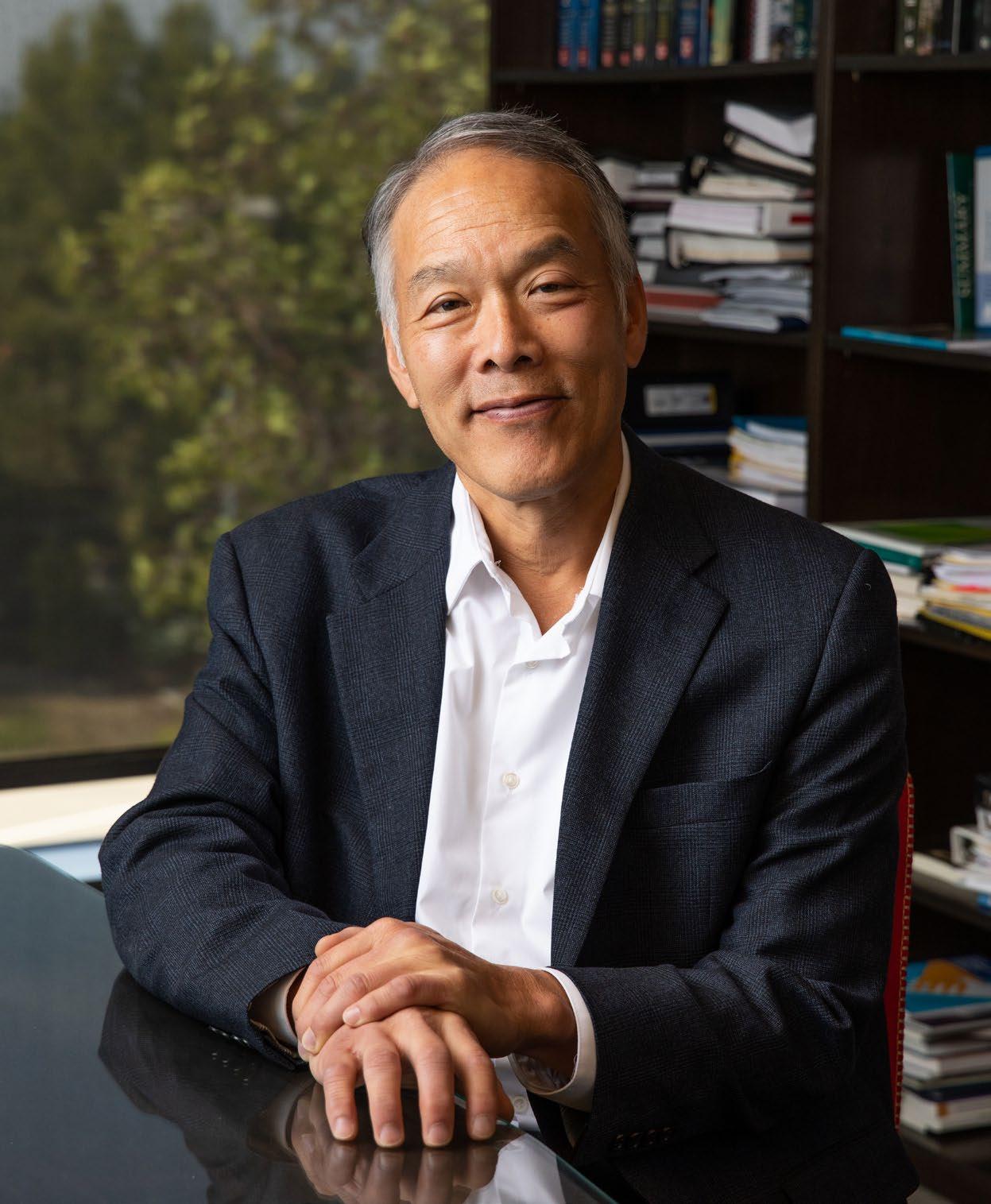 Flora L. Thornton Chair and Professor Department of Population and Public Health Sciences
Flora L. Thornton Chair and Professor Department of Population and Public Health Sciences
5
Photo by John Davis
FOCUS ON HEALTH EQUITY
The Department of Population and Public Health Sciences is solving public health and health equity challenges through discovery, training and action centered around these key areas.
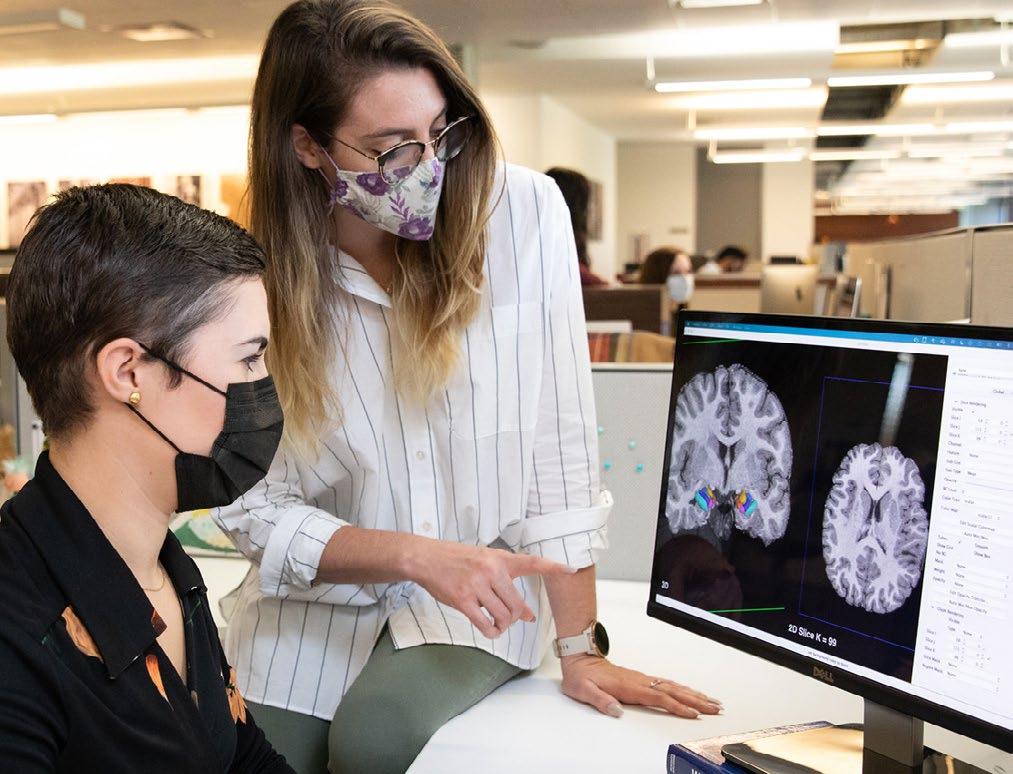
EDUCATING FUTURE HEALTH LEADERS
We are educating the next generation of population and public health professionals who are fully equipped with the knowledge, skills, and leadership training for successful careers that champion and advance health equity. These leaders enact impactful changes in government, academia, health care facilities, nonprofits and industry to evaluate population health challenges and implement the best policies, as well as prevention and health care practices, that improve the health of communities as a whole.

HARNESSING DATA AND TECHNOLOGY
We are utilizing advanced data methods and emerging technologies to better understand health disparities, to provide equitable access to health advances and to address population health issues across the lifespan. We are harnessing the power of data and unique sources of data to identify the risk factors of disease, to better predict health outcomes, to bring greater representation of vulnerable and under-represented populations into studies, and to guide the development and evaluation of interventions that prevent poor health outcomes and promote wellness. A particular emphasis is placed on initiatives that minimize health equity gaps through expanding the breadth of populations studied and creating access to interventions for diverse populations.
6
Photo by John Davis
Photo/USC
UNDERSTANDING DISEASE, IMPROVING QUALITY OF LIFE

We are investigating and addressing the health impacts of lifestyle, genetics, environmental risk factors, social policies and structures. Through etiology research, we seek to understand the root causes of diseases and the impact of other factors on conditions such as obesity, addiction, diabetes, cancer, cardiovascular disease, mental illness, infectious disease and more. By partnering with communities and organizations we identify opportunities for prevention and early detection, and develop evidence-based interventions to reduce health disparities and improve the overall quality of life of diverse populations.
ADVANCING HEALTH GLOBALLY
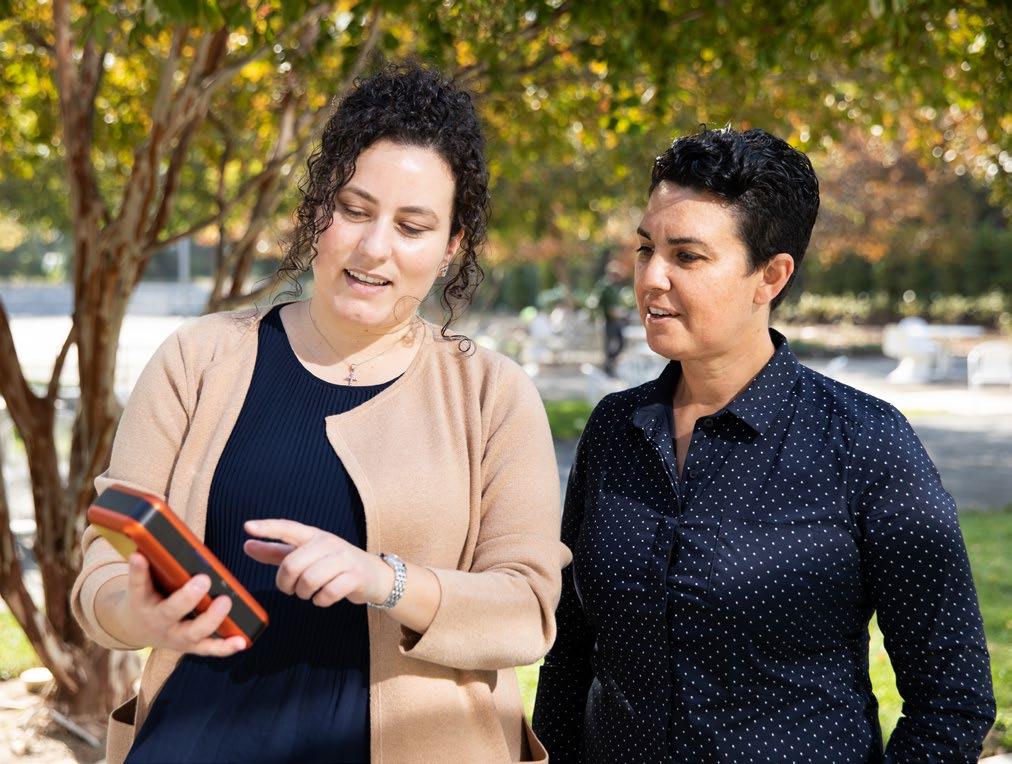
We are tackling health equity gaps related to some of the most pressing public health issues like pandemic preparedness, infectious diseases, HIV/AIDS, and sexually transmitted diseases in communities across the globe. We are actively engaging and partnering with in-country stakeholders in countries located in Southern Africa, South and Southeast Asia, and Latin and Central America at local and governmental levels to support the development of talent able to empower local expertise, advance community health and bring about systemic change.
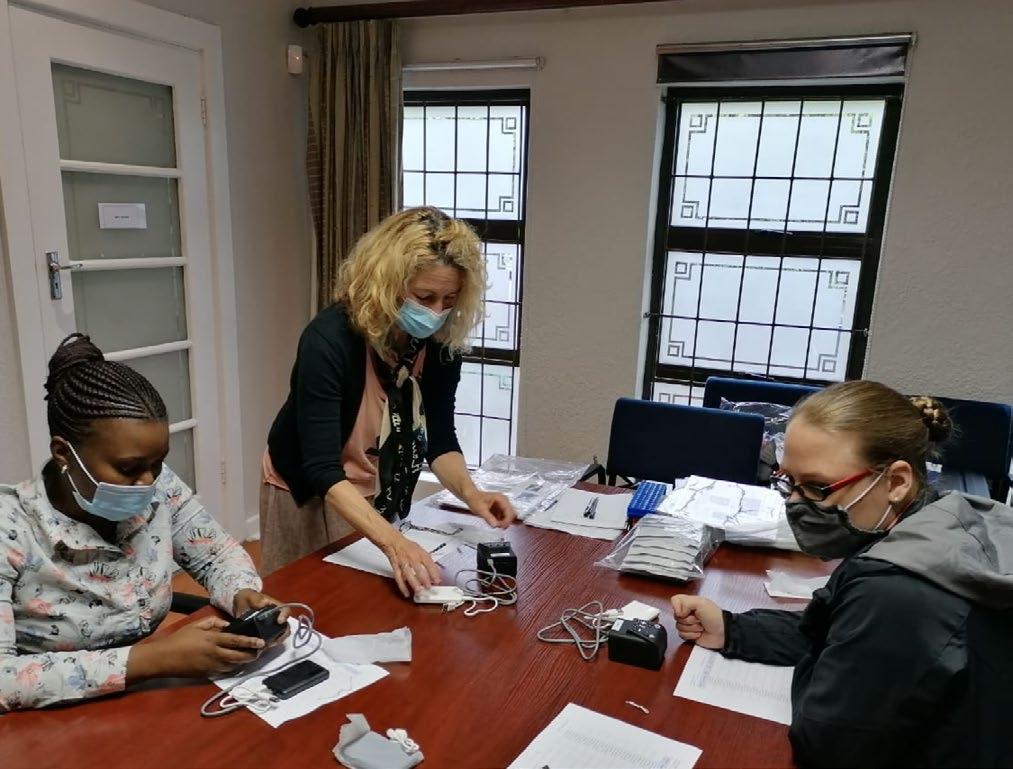
ADDRESSING ENVIRONMENTAL CHALLENGES
We are advancing the understanding of the roles air pollution, contaminants and toxicants have in human health, including links to diabetes, obesity, asthma, liver disease,and neurological impacts. We are leading sustainability in health care research to drive solutions for change. We are also leading sustainability efforts to address the health implications of climate change, and are testing interventions and solutions to mitigate these impacts. Our science and data are influencing policy, educating the public on how to reduce their risks and empowering communities to advance and advocate for change.
7
Photo/Pexels
Photo courtesy Klausner Research Group
Photo by John Davis
8 34% Underrepresented minorities
373 Undergraduate 31% 716 Master’s 60% 105 Doctoral 9% 1194 STUDENTS 20% First-Generation 79% Female 290+ STAFF 13 DEGREE PROGRAMS 6 DIVISIONS 119 FULL-TIME FACULTY 4.1K ALUMNI academic year 2022-2023 65 JOINT AND ADJUNCT FACULTY
BY THE NUMBERS
Over 29 Community events led 18 26
for 5 years running towards diversity, equity, inclusion and belonging efforts in the Department 4 Department-based DEIB working groups domestic and international
Over 279K Individuals reached through community partners, events and activities
$1.8M FUNDING SECURED 9 RESEARCH LABS CENTERS 3 INSTITUTES $65.3M 248 222 External funding (FY2022) Grant submissions (2022) Grants (FY2022)
#2 IN NIH FUNDING
180+ COMMUNITY PARTNERS Over 78 Community events participated in
IMPACT OF EDUCATION
Vice Chair for Education


12
“We train outstanding students, professionals and future leaders as champions of health equity.”
ROBERTA MCKEAN, PHD
Photo by John Davis
Photo by John Davis
A PIPELINE - AND FUNDINGFOR STUDENTS GOING ON TO WORK IN PUBLIC HEALTH DEPARTMENTS

The Department of Population and Public Health Sciences has been awarded $1.5 million from the U.S. Department of Health and Human Services towards a scholarship program. The Health Resources and Services Administration grant is allocated for training a robust public health workforce through the provision of Master’s in Public Health scholarships. The Department was one of only 29 universities in the nation to receive the grant.
The program - one of several ways the Department is leveraging funding for education - is launched on the heels of the COVID-19 pandemic that witnessed a strain on local public health departments and fueled an interest in public health professions. The grant will launch Trojan Scholars for Advancement in Public Health (TSAPH), a networking and mentorship program which serves as a pipeline for students interested in careers in local public health departments and community-based organizations.
“We are excited to provide an unprecedented opportunity for students with excellent potential for success in public health to attend USC without the financial burden,” shares Amie Hwang, PhD, MPH, Director of the MPH program and TSAPH.
The grant is dedicated to funding MPH tuition costs over the next three years and special consideration will be given to students from disadvantaged backgrounds. These students will have an opportunity to receive a top-tier education from vibrant and dynamic faculty and develop skills to increase employment readiness. The program requires additional training in linguistically and culturally sensitive program implementation, DEI, and topics that are relevant to the current status of public health.
To support these activities, the Department has partnered with 12 organizations across Los Angeles to establish career pathways and provide field experience where trainees can complete their practicum requirement. Ultimately, the program will enhance the skills of practitioners to effectively address persistent community health needs as well as public health emergencies.
Read the full story
13
Photo by John Davis
“We are excited to provide an unprecedented opportunity for students with excellent potential in public health to attend USC without the financial burden”
- Amie Hwang, PhD, MPH
A MENTAL HEALTH SUPERHERO TAKES THE WHITE HOUSE BY STORM
MPH candidate Carla Ibarra visited the White House as part of MTV’s first Mental Health Youth Action Forum, a cohort of 30 young people selected to advocate in Washington D.C. for mental health. “The goal of the forum is actually to encourage and move society from mental health awareness… into action through storytelling and media,” says Ibarra.
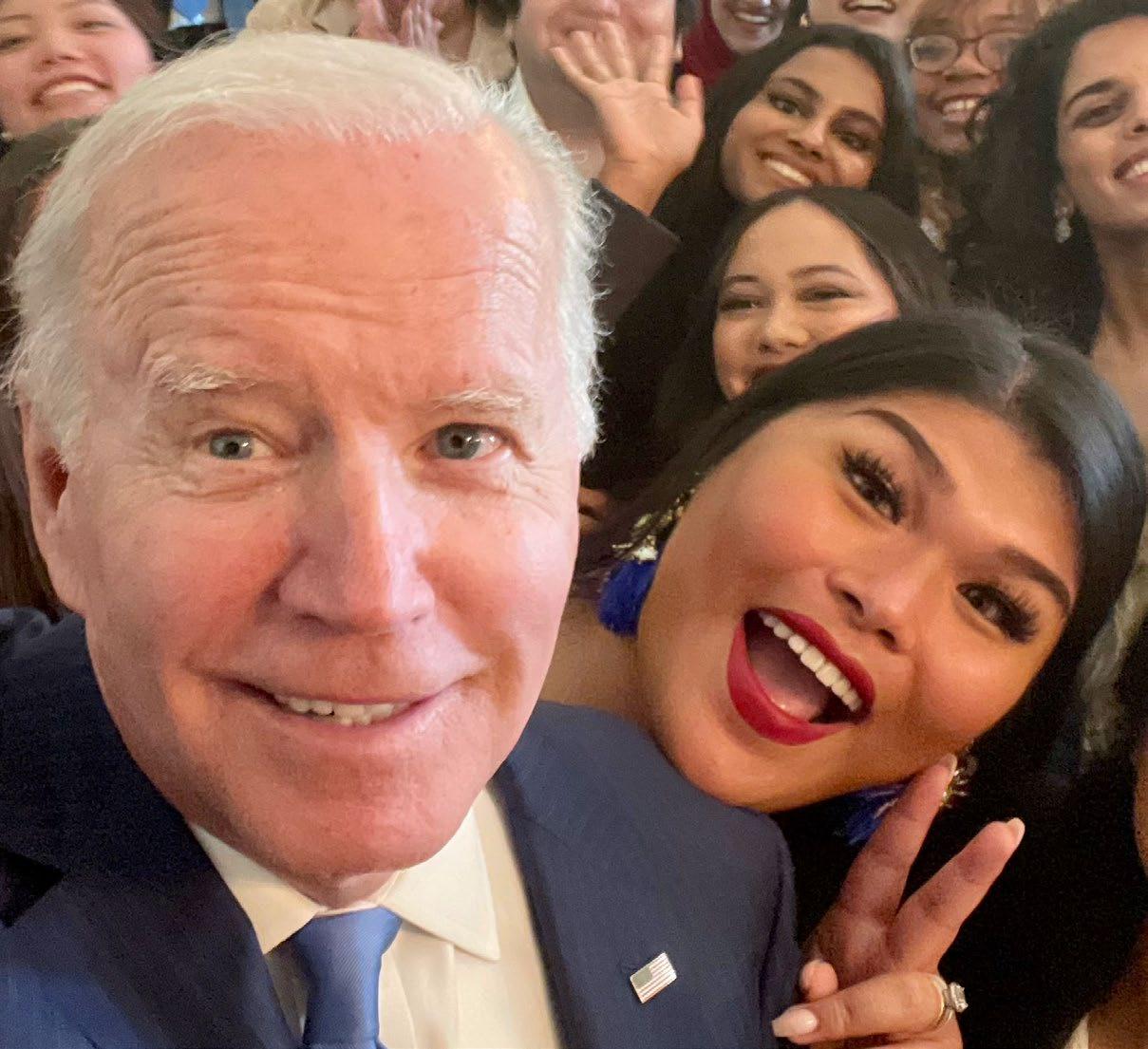
The group created story-based mental health campaigns to present to officials, in connection with the Substance Abuse and Mental Health Services Administration (SAMHSA) within the U.S. Department of Health and Human Services (HHS), and 18 other non-profits. Ibarra’s team addressed mental health issues prevalent in HIV-positive young people who are also part of traditionally marginalized groups. Their superhero-themed campaign, “The Broken Universe,” emphasized “how it’s actually the society that is broken,” says Ibarra, “not these young people.”
At the White House, Ibarra met with President Biden, Surgeon General Vivek Murthy, Dr. Jill Biden and Selena Gomez. To Murthy, she advocated for a more robust federal response to meth use, and for increased federal funding for data equity. “As a trans woman, I don’t see myself represented in numbers,” says Ibarra. Murthy’s office has expressed interest in working with Ibarra, who has held positions at Saint
John’s Community Health and the Los Angeles County Department of Public Health. She is also a member of the Transgender Advisory Council for City of LA.
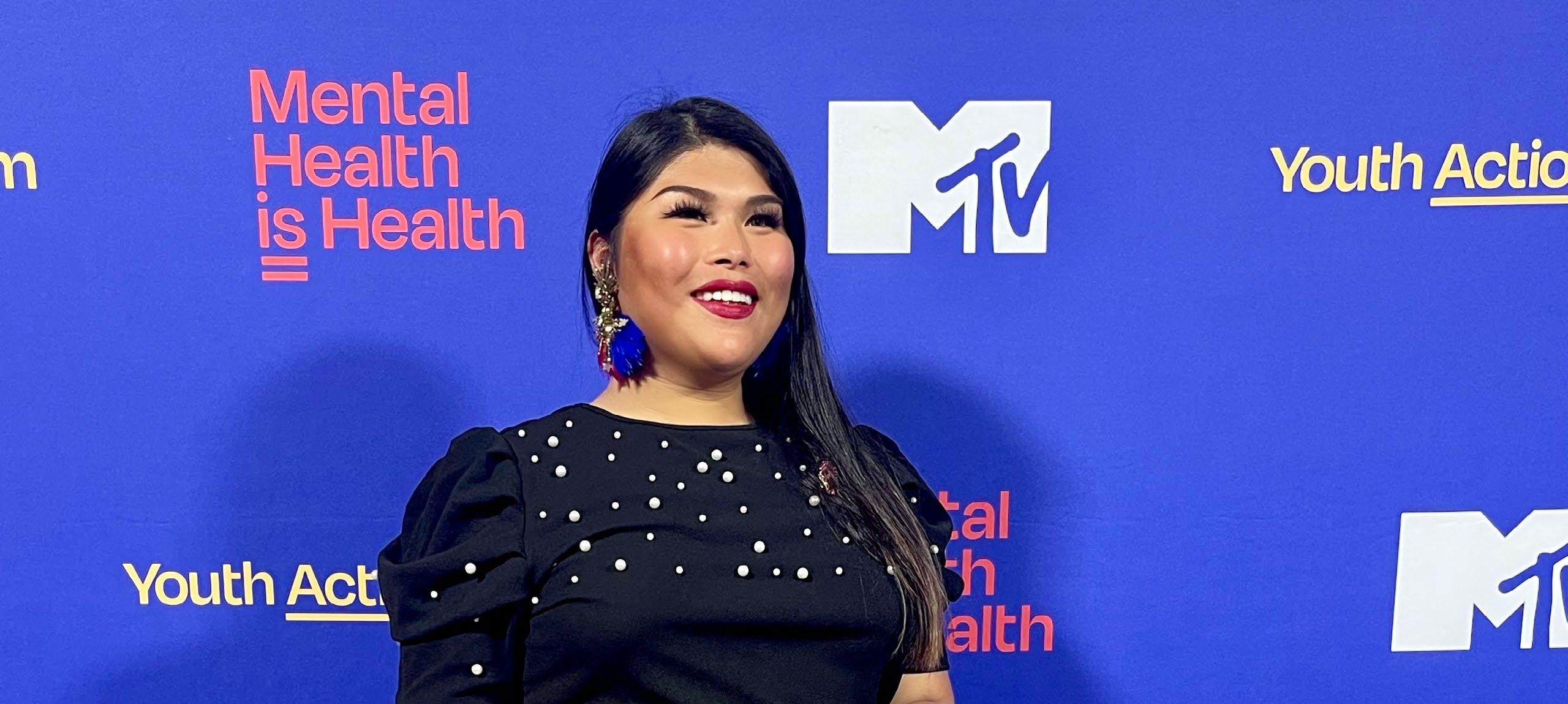
In a one-on-one with President Biden, Ibarra discussed the administration’s commitment to support mental health, the 9-8-8 crisis hotline and the need for grants for state and local governments to fill gaps in resources.
Read the full story
14
Photo courtesy Carla Ibarra
Photo courtesy Carla Ibarra
“It’s actually the society that is broken, not these young people.”
- Carla Ibarra, MPH candidate
NEW MASTER OF ADDICTION SCIENCE SEEKS TO REVOLUTIONIZE ADDICTION TREATMENT
The USC Institute for Addiction Science (IAS) aims to revolutionize the way substance use is discussed, treated and prevented through a new Master of Addiction Science (MAS), the first degree of its kind to be offered at a major university, melding pharmaceutical, medicine and social work together.
The new program is a cross-disciplinary curriculum partnership between the USC Alfred E. Mann School of Pharmacy and Pharmaceutical Sciences, USC Suzanne Dworak-Peck School of Social Work, and Keck School of Medicine of USC Department of Population and Public Health Sciences.
ALUMNI IN ACTION
MAKING PROSTHETICS FOR KIDS
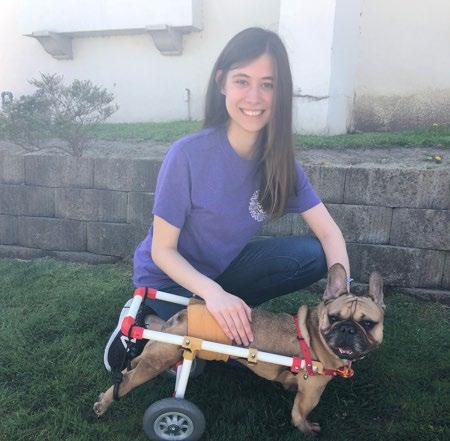
Treatment for addiction, like the majority of the health care system, is largely based on a siloed structure of specialists. The MAS seeks to create a new integrated system of care model that blends science-based disciplines together, providing practitioners with an ability to co-deliver treatment and prevention for greater impact and increased patient satisfaction, while also working closely with researchers to explore emerging scientific developments.
MAS curriculum is focused on examining a wide variety of addictions — from opioids and alcohol to vaping and gambling — with myriad approaches to prevention and treatment. Students will develop the skills to translate research theory into clinical practice that is unique to an individual patient and their history, making it a true “bench to bedside” program.
Read the full story
Olivia Wong entered freshman year knowing she wanted to work in health care. Working with 3D4E within USC Freehand, a 3D printing club, Wong helped provide “free and custom 3D printed prosthetics to children with hand differences at Children’s Hospital Los Angeles,” says Wong. The service included consultation and design through assembly and delivery.
Wong is an alumni of the Bachelor of Science in Health Promotion and Disease Prevention program.
15
“Seeing the smiles on the faces of the children as they learned to use their new devices was an incredible experience.”
- Olivia Wong, BS ‘22
Photo courtesy Olivia Wong
“Addiction isn’t just about any one component. Students need to understand the underlying biological processes to the overall impact on society.”
- Jessica Barrington-Trimis, PhD, MS, MA
STUDENT AWARDED FOR INCLUSIVE RESEARCH RECOMMENDATIONS
Isabella Hernandez is a 2022 recipient of the Public Health Education and Health Promotion (PHEHP) Student Award from the American Public Health Association (APHA).
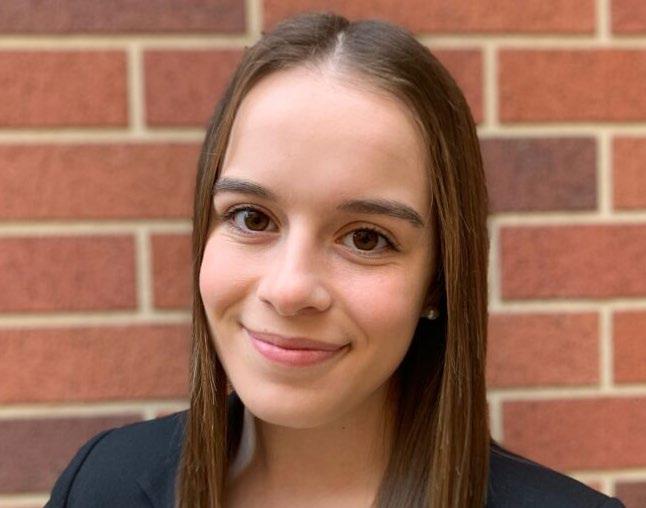
Hernandez was the lead author on research that identified racial, ethnic, heteronormative, and gender bias in questionnaires administered to participants of the Environmental influences on Child Health Outcomes (ECHO) cohort. Along with a team of researchers, she evaluated over 245 forms and found that over one-third (36%) featured problematic language. Their findings informed their recommendations to the ECHO scientific community on how to conduct inclusive research.
“When participants are filling out these forms and something doesn’t sit right with them, it influences their responses to questions, and may affect their attitudes towards participating in the study,” explains Hernandez, a senior in the Bachelor of Science in Health Promotion and Disease Prevention program. “It is not helpful to collect data when our participants are not able to accurately reflect their experiences and identity because options don’t exist for them to choose.”
Improvements in data collection tools is one of many steps to addressing the lack of research on marginalized groups.
Isabella has presented this work to the consortium of investigators at meetings attended by over 1,000 investigators.
Read the full story
ALUMNI IN ACTION
GLOBAL HEALTH ALUMNI RECEIVE FULBRIGHT U.S. STUDENT PROGRAM GRANTS

Justin Kawaguchi, BS ‘21 and Ellen Minkin, BS ‘22, who both majored in global health, are two of 22 USC students to receive Fulbright U.S. Student Program Grants for 2022-2023.
Kawaguchi won an English Teaching Assistant Award to Taiwan and plans to create lunch-and-learn programs to engage in meaningful dialogue over combined Western and Taiwanese meals. Minkin won an open study/research award to the Netherlands, where she will be researching the effectiveness of primary school sexual education.
16
Photo/iStock
Photo courtesy Isabella Hernandez
“It is not helpful to collect data when participants are not able to accurately reflect their experience and identity.”
- Isabella Hernandez, BS candidate
IT TAKES TWO: USING DANCE TO AUGMENT

STEM COURSE CONTENT
David Black, PhD, Professor, includes experiential learning in his classes to create engaging lessons for his mostly pre-med students. “Our Health Promotion students often focus their attention on STEM content, but they can further benefit from the arts, which can reveal varied ways of expressing oneself in personal and professional encounters,” suggests Black.
He reached out to Jesus ‘Jay’ Fuentes, a lecturer at USC Glorya Kauffman School of Dance who teaches one of USC’s ‘most popular’ classes—International Style Ballroom Dance. Fuentes is an accomplished performer in the entertainment industry whose work includes the renowned film, Dirty Dancing.
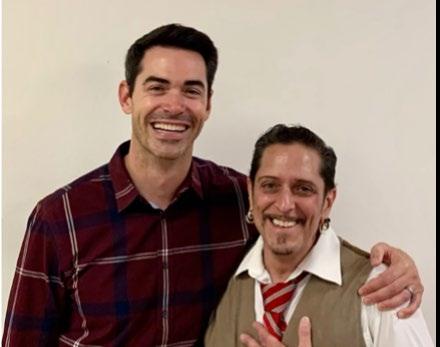
They partnered up to teach students about gross motor behavior (skills which require whole body movements) through performative art. Fuentes introduced the students to the foundational box step, a basic formation named after the pattern it creates on the floor. This technique is used in various ballroom dances including the waltz and rumba. He gracefully demonstrated the sequence giving the impression of mastery with ease. However, this beginner dance routine offered the student’s a first-hand encounter of the finnicky nature of attempting to perform a novel behavior.
“In their future career, many of our students will ask their patients to change a behavior such as smoking, diet, or medication adherence” explains Black.
His lesson underscores that new skills take practice. The giggles, frustrations and four-step movements of the dance were examples of elements of a person’s behavioral repertoire, imparting “a reminder that learning new behaviors is not always simple,” says Black.
His class provided a stimulating activity for students to critically think about all the behaviors that go into adherence. Black’s approach struck a chord with his class. They were able to draw parallels between behaviors required for adherence and mastering a new skill through dance.
Read the full story
17
“Dance imparts a reminder that learning new behaviors is not always simple.”
- David Black, PhD
Photo/Pexels
Photo courtesy David Black
ONE TROJAN’S JOURNEY FROM STUDENT TO STAFF
DEPARTMENT KICKS OFF INAUGURAL ALUMNI COUNCIL
The Department of Population and Public Health Sciences introduces its first Alumni Council, a group of committed individuals who will help strengthen department programs and the impact of its graduates.
The council represents more than 4,100 alumni who have graduated from programs at the undergraduate, master’s, doctorate and post-doctorate levels. Two seats are held by current students who serve in a leadership capacity and two seats are held by faculty members.
Steven De La Torre, MPH online ’15, HBR PhD projected ’23 Graduate Research Assistant USC Keck School of Medicine
Rachna Desai, BS ’04 Program Manager Providence Health
Ramon Llamas, MPH on campus ’09 Founder/Social Entrepreneur + Strategist Consultant
Serineh Melidonian, MD, BS ’99 Physician
Adventist Health Glendale
Lucy Ruderman, BS ’16
MPH Student / Public Health Research Fellow
Rose Park, EdD, MPH, CHES becomes the first Director of Student Affairs within the Department, and expands her role to support the faculty, staff, and students in all the educational programs within the Department.
Park is a triple-Trojan who obtained two out of her three degrees from the Department. She earned her Bachelor of Science in Health Promotion and Disease Prevention in 2002 and her Master of Public Health in Health Communication in 2004. While working fulltime in a student-facing role, Park pursued her doctoral degree in Higher Education Leadership at USC Rossier School of Education, further enhancing her knowledge and skills in the field.
UNC Gillings School of Global Public Health / FHI 360
Hayley Sayrs, MPH on campus ’20 Grants Manager
VIP Community Mental Health Center
Melody Serra, MPH on campus ’11 Educator/Software Engineer
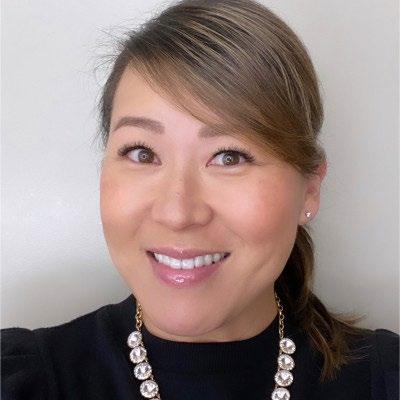
Year Up
Kayla Tilton, BS ’17, MPH on campus ’19 Account Supervisor
Fraser Communications
Nicole Vick, MPH on campus, ’05 Program Director County of Los Angeles
18
“I look forward to working collaboratively with students, faculty, and staff to create a positive and supportive environment that fosters success for all of our students.”
- Rose Park, EdD, MPH, CHES
STAFF HIGHLIGHT
Photo courtesy Rose Park
USC LATINO ALUMNI ASSOCIATION SCHOLAR ADVISES NEXT GENERATION

Reyna Macias, MPH ’11 is a 2022-2023 recipient of the USC Latino Alumni Association (LAA) scholarship. She is one of eight scholars from the Department to receive this recognition. Macias is transitioning into the role of Assistant Director of Career Services after having served as Academic Advisor for the Master of Public Health program for four years.
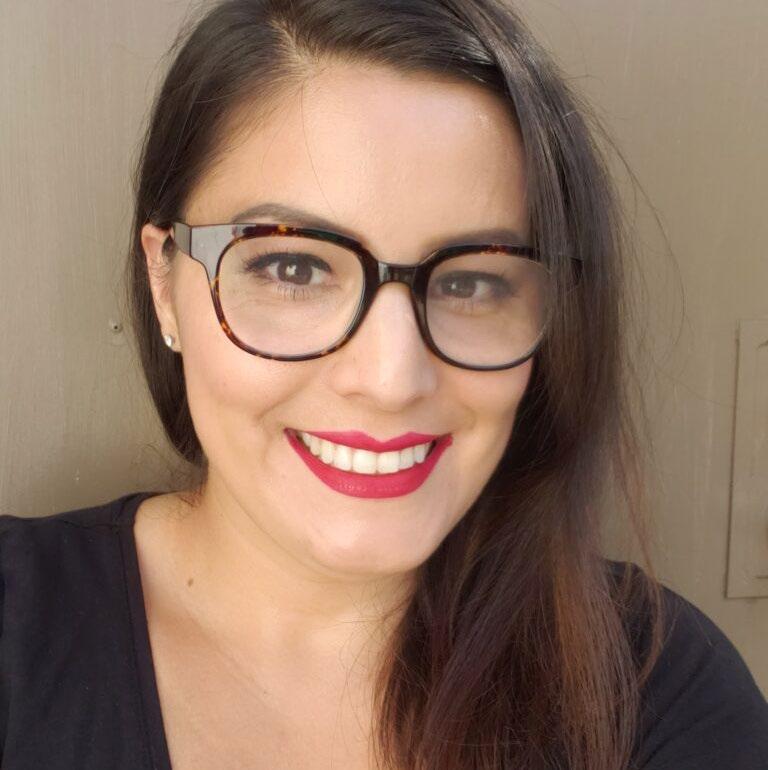
Faculty Representatives:
Rita Burke, PhD, MPH Associate Professor of Clinical Population Health Sciences
Jane Steinberg, PhD, MPH
Associate
Professor of Population Health Sciences
The USC LAA scholarship will further extend her engagement through a larger network. Macias is pursuing her doctoral degree in Higher Education Administration from USC Rossier School of Education. Her goal is to ensure that public health careers are more accessible to youth in under-resourced neighborhoods, to lend their voices to addressing health inequities, and become future public health leaders.
“Get knee-deep where the need is. It will inspire you to do something to improve it.”
- Reyna Macias, MPH, CHES
19
Photo courtesy Reyna Macias
STAFF HIGHLIGHT
Photo by John Davis
FUTURE EPIDEMIOLOGIST PREVENTS MOSQUITO-BORNE ILLNESS
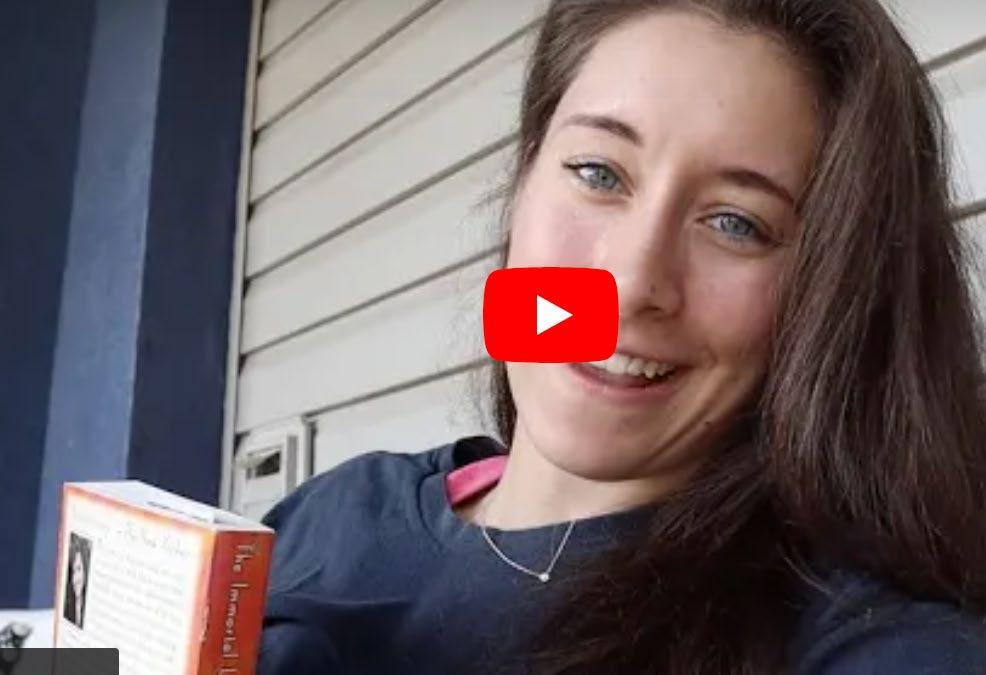
Joining the Master of Public Health online program in the midst of the COVID-19 pandemic, Kristin Reichardt saw firsthand the crucial role that epidemiologists play in combating disease outbreaks and other public health emergencies.
Reichardt’s passion for public health initially began during her undergraduate studies. As a biology student at University of Notre Dame, she landed an internship in her hometown of Arlington, Texas, that focused on mosquito control.
“West Nile virus is really bad in Tarrant County, in Arlington. I did some work setting mosquito traps and going around talking to people whenever we got traps that came back positive for West Nile. That meant I did a lot of public outreach during that internship, and that’s where I really first got interested in public health,” she told USC Online.
After graduation, Reichardt married a U.S. Navy member, leading travel all across the country and an eventual relocation to Augusta, Georgia. There, Reichardt continued her work with mosquito control at the Georgia Department of Public Health. Still, she knew she needed to deepen her knowledge and hone her skill sets.
“I chose the [biostatistics and epidemiology] concentration because while I was at mosquito control, I had all this surveillance data and wanted to
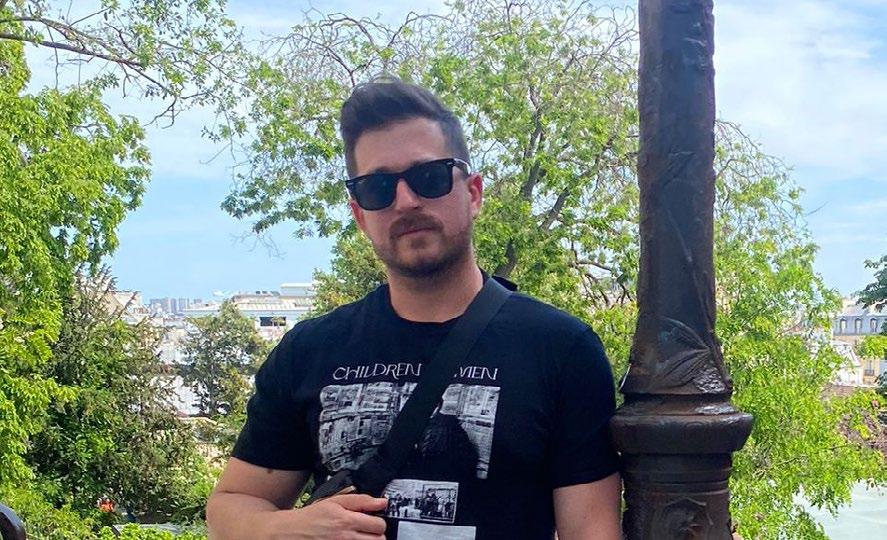
ADVOCATING FOR UNHOUSED PEOPLE THROUGH RESEARCH
As a PhD candidate in the Health Behavior Research program, Goldshear uses multiple research methods – including ethnography, interviews and quantitative analysis – to examine how social and political factors impact unhoused people in Los Angeles who use drugs. Goldshear translates his research via modes such as manuscripts, talks and conference presentations that might positively impact his research subjects. His work is a testament to his belief that “good social science can be both rigorous and tell powerful, emotionally moving narratives.”
be able to do more with it and improve my data analysis skills,” Reichardt explained. The online MPH at Keck School of Medicine is one of the few master’s programs that offers a focus in biostatistics and epidemiology. Following graduation, Reichardt hopes to work in a government agency’s public health department as an applied epidemiologist, specifically in disease control and prevention.
Read the full story
: iStock 20
Photo
“Many participants in my studies have entrusted me with their stories, and my job now is to do them justice.”
- Jesse Lloyd Goldshear, MPH PhD candidate, 2023
Photo courtesy Kristin Reichardt
Photo courtesy Jesse Lloyd Goldshear
ONLINE MPH STUDENT FIGHTS TO IMPROVE WELL-BEING OF PEOPLE WITH HIV
Like millions of Americans, David “Jax” Kelly remembers when an HIV diagnosis was considered a death sentence, as the virus would likely cause AIDS and heighten the risk of contracting life-threatening infections. Kelly knows this firsthand, having kept in top shape while living with HIV for 16 years and counting. But keeping HIV in check raises another challenge: how to help people who are aging with the condition get the care and support they need.
“We need to find ways to increase their acceptance into programs that can meet their needs — which also means eliminating any stigma,” Kelly told USC Online. “That’s my biggest goal.”
“I started learning more about the field, and more and more of the people doing impactful programmatic and policy work were ones who held this degree,” Kelly explained. The MPH online program widened the geographic scope of Kelly’s volunteer work from the East and West coasts to the Midwest. His practicum involved interning with the AIDS Funding Collaborative, a public-private partnership that provides grants and other services to bolster responses to HIV in Cleveland. Without slowing down, Kelly became chair of an Ohio Department of Health community committee focused on the needs of people growing older with HIV.
Over the years, Kelly’s skills and determination have been called upon by Los Angeles County, the California state government and a number of nonprofit agencies — including the Palm Springs chapter of Let’s Kick A.S.S. (AIDS Survivor Syndrome), for which he serves as president. Kelly realized that many of the professionals he worked with listed MPH among their credentials.
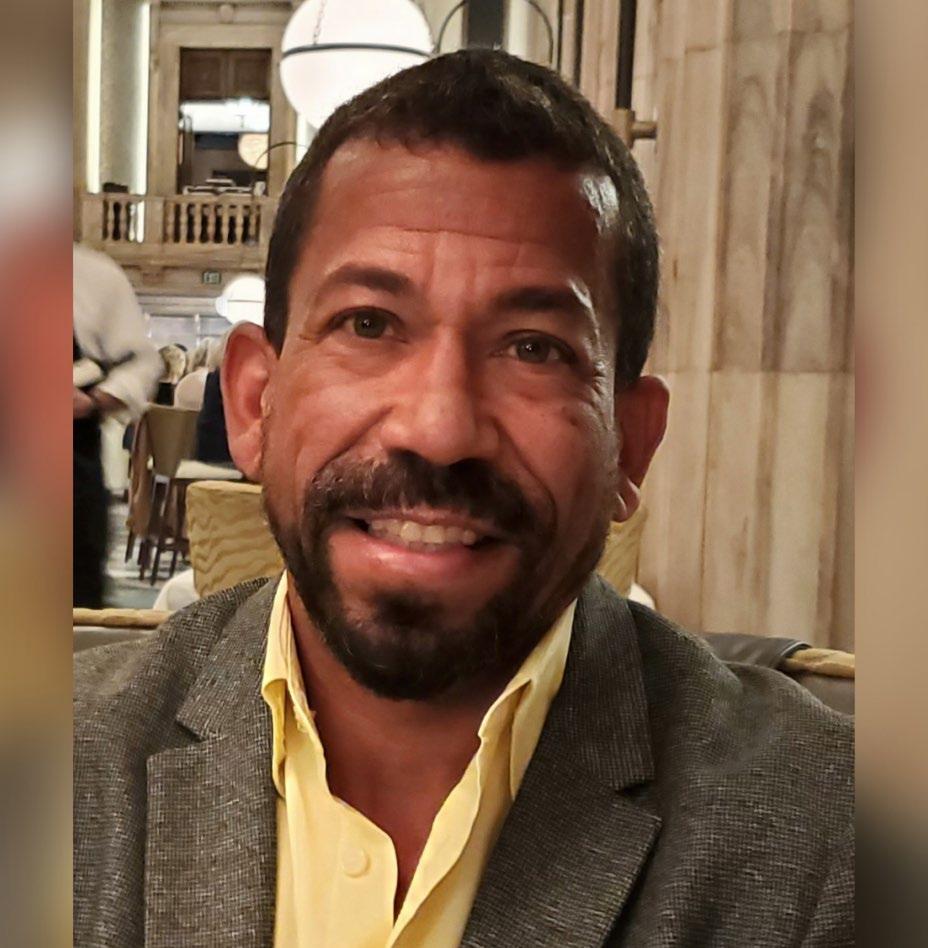
One of the MPH’s biggest advantages, according to Kelly, was that he could immediately apply what he was learning to his own aims. “Every time I got an assignment, I tried to somehow focus it on HIV and aging,” he said.
Read the full story
ANTI-RACISM IN CURRICULUM
The Department of Population and Public Health Sciences has dedicated resources, as part of its diversity, equity, inclusion and belonging efforts, to developing a new curriculum that will include anti-racism training in every course. This collaborative initiative is being driven by a working group made up of faculty, staff and students at all degree levels, and is overseen by the Racial Equity, Diversity and Inclusion (REDI) Council in the Department.
21
“We need to find ways to increase their acceptance into programs that can meet their needs - which also means eliminating any stigma.”
- David “Jax” Kelly, MPH candidate
Photo courtesy Jax Kelly
IMPACT OF RESEARCH

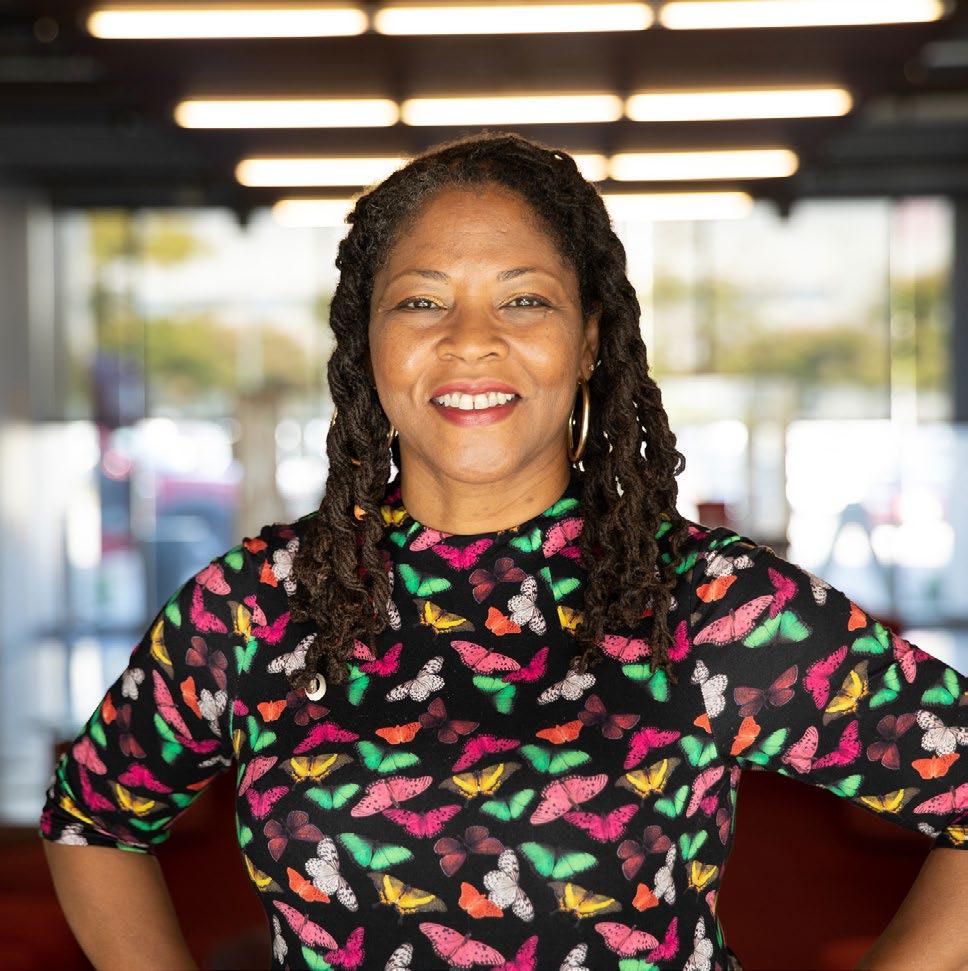
24
“We pursue high-impact, transdisciplinary research and discoveries as we strive to enhance human health and quality of life in Los Angeles and around the globe.”
CHANITA HUGHES HALBERT, PHD
Vice Chair for Research
Photo by John Davis
Photo by John Davis
LARGEST-EVER GENETIC STUDY OF PROSTATE CANCER IN MEN
OF AFRICAN DESCENT FINDS NEW RISK FACTORS
Prostate cancer takes a greater toll on Black men than on men of other races. In the United States, one in six Black men will get prostate cancer in their lifetime, compared to one in eight men overall. Black men are also more than twice as likely to die from the disease.
While past studies have identified nearly 270 genetic variants linked to prostate cancer risk, researchers have yet to find a clear explanation for the disproportionate risk among men of African ancestry. Genetic research thus far has also failed to predict which men face a high risk for aggressive prostate cancer, versus those who may get less deadly forms of the disease.
New discoveries from the largest-ever study of prostate cancer in men of African descent are now addressing those long unanswered questions. The meta-analysis, led by researchers at the Keck School of Medicine of USC, includes genome-wide association study data from more than 80,000 men.
The study identified nine new genetic risk factors for prostate cancer, seven of which are found either largely or exclusively in men of African ancestry. For the first time, researchers also found that genetic differences can help determine which men are most
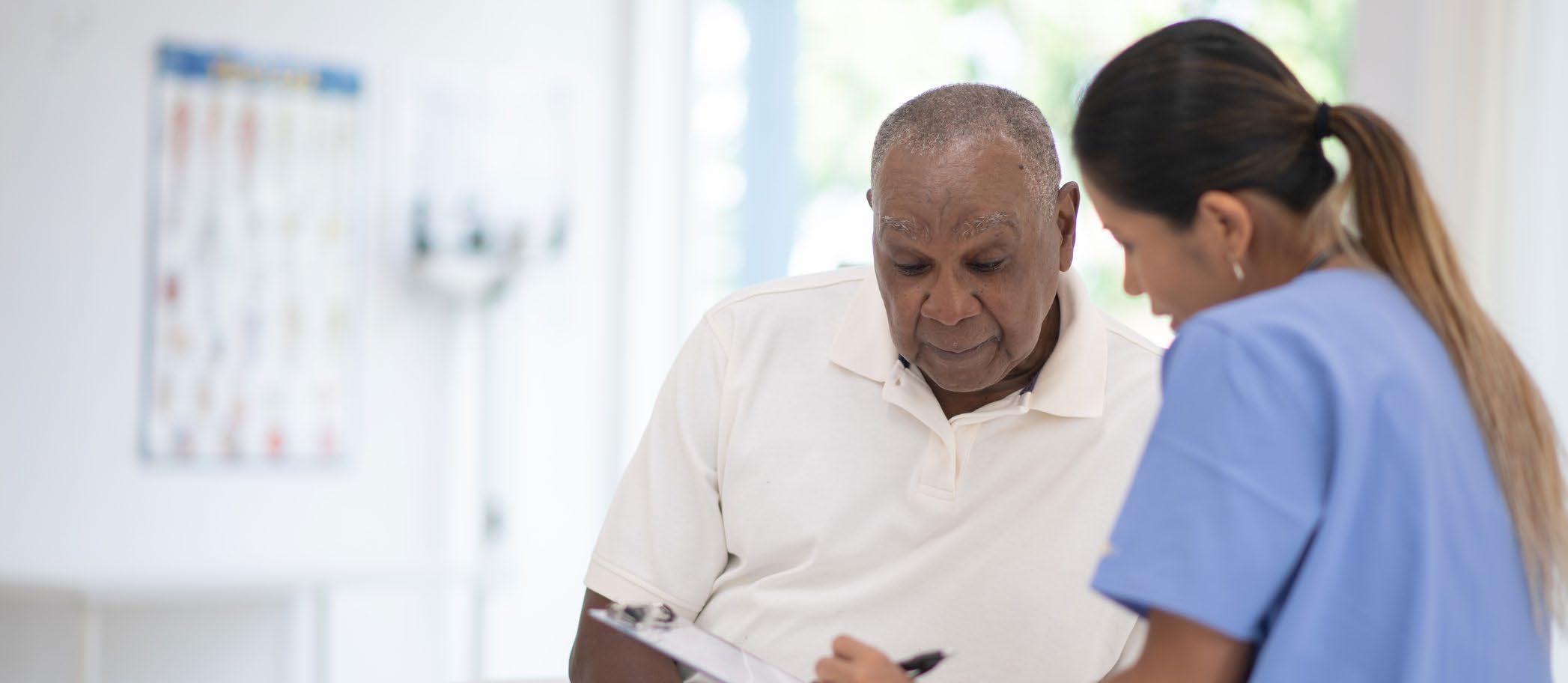
likely to develop aggressive prostate cancer. The study was published in the journal European Urology.
“The ability to differentiate between the risk for aggressive and non-aggressive forms of the disease is of critical importance,” said Christopher Haiman, ScD, AFLAC Chair in Cancer Research at the USC Norris Comprehensive Cancer Center and senior author of the study. “Until now, risk scores haven’t been able to do that.”
Earlier research by Haiman’s team identified many genetic risk factors for prostate cancer and offered early insights on risk among men of African ancestry. Evidence of risk factors specific to this population points to the importance of continuing to collect data from diverse groups, including men of African, Asian and Hispanic descent.
Authors from the Department include Christopher Haiman, ScD, Fei Chen, PhD, David V. Conti, PhD, Sue A. Ingles, DrPH, and Mariana C. Stern, PhD.
Read the full story
25
Photo/iStock
“The vast majority of studies have been conducted in populations of European ancestry, which creates a huge bias in our understanding of genetic risk for disease.”
- Christopher Haiman, ScD
EV CARS MAKE FOR CLEANER AIR IN LOS ANGELES
SYNTHETIC “FOREVER CHEMICAL” LINKED TO LIVER CANCER
Exposure to a synthetic chemical found widely in the environment is linked to non-viral hepatocellular carcinoma, the most common type of liver cancer, according to a new study conducted by researchers from the Keck School of Medicine of USC and published in JHEP Reports.
The chemical, called perfluooctane sulfate or PFOS, is one of a class of man-made chemicals called per- and polyfluoroalkyl substances, or PFAS. These chemicals, which are used in a wide range of consumer and industrial products, are sometimes called forever chemicals because they break down very slowly and accumulate in the environment and human tissue, including the liver.
“Liver cancer is one of the most serious endpoints in liver disease and this is the first study in humans to show that PFAS are associated with this disease,” said Jesse Goodrich, PhD, a postdoctoral scholar in the Department of Population and Public Health Sciences at the Keck School of Medicine.
The team at the Keck School of Medicine was able to use human samples collected as part of a large epidemiological study, a collaboration between the medical school and the University of Hawaii, called the Multiethnic Cohort Study. This project has followed more than 200,000 residents of Los Angeles and
A team of researchers from the Keck School of Medicine of USC have begun to document the actual impact of electric vehicle adoption in the first study to use real-world data to link electric cars, air pollution and health. Leveraging publicly available datasets, the researchers analyzed a “natural experiment” occurring in California as residents in the state rapidly transitioned to electric cars, or light-duty zero emissions vehicles (ZEVs). At the zip code level, for every additional 20 ZEVs per 1,000 people, there was a 3.2% drop in the rate of asthmarelated emergency visits and a small suggestive reduction in NO2 levels. On average across zip codes in the state, ZEVs increased from 1.4 to 14.6 per 1,000 people between 2013 and 2019. ZEV adoption was significantly lower in zip codes with lower levels of educational attainment.

HEALTH OF MOTHERS AND BABIES IN LOS ANGELES

“The impacts of climate change on health can be challenging to talk about because they can feel very scary. We’re excited about shifting the conversation towards climate change mitigation and adaptation, and these results suggest that transitioning to ZEVs is a key piece of that.”
- Sandrah Eckel, PhD
Photo/Pexels
26
Photo/iStock
Hawaii for the development of cancer and other diseases. This repository of human blood and tissue samples allowed the research team to find 50 participants who eventually developed liver cancer, evaluate the blood samples that were taken prior to their cancer diagnosis and compare these with 50 people who did not develop cancer from the same study.
Researchers found several types of PFAS in the blood samples that were taken before the participant developed liver cancer. The research revealed that the strongest association was between PFOS and liver cancer and that subjects in the top 10% of PFOS exposure were 4.5 times more likely to develop liver cancer than those with the lowest levels of PFOS in their blood.

Authors from the Department include Jesse Goodrich, PhD, Hongxu Wang, Tiffany Lim, Rob Scot McConnell, MD, David V. Conti, PhD, Lida Chatzi, MD, PhD, and Veronica Wendy Setiawan, PhD.
Read the full story
Data from 628 predominantly low-income Hispanic women pregnant with a single baby was collected over 6 years as part of USC’s MADRES (Maternal and Developmental Risks from Environmental and Social Stressors) Center. The findings suggest that protecting pregnant women from air pollution may improve birth weight, especially among stressed-out mothers living in environmentally burdened neighborhoods.
“We are still seeing harmful effects of air pollutants on birth weight... in vulnerable populations.”
- Carrie Breton, ScD
27
Photo/iStock
“We believe our work is providing important insights into the long-term health effects that these chemicals have on human health.”
- Lida Chatzi, MD, PhD
EXPOSURE TO AIR POLLUTION CAN WORSEN PATIENT OUTCOMES FROM COVID-19

Data from a new USC study shows a significant increase in the risk of severe outcomes for COVID-19 patients exposed to fine particles (PM2.5) and nitrogen dioxide (NO2), two common (and correlated) components of ambient air pollution in Southern California. Produced by ground and air traffic, industrial burning and other sources, these air pollutants can exacerbate the effects of the SARSCoV-2 virus over both the short and long term.
“Our research demonstrated that one-year average exposure to PM2.5 translated to a 20-30 percent increase in the risk of hospitalization, intensive respiratory support and ICU admissions from COVID-19. Exposure to NO2 for one month carried an increased risk of 12-18 percent,” said Zhanghua Chen, assistant professor of population and public health sciences at the Keck School of Medicine of USC and co-first author of the study. “We also saw that longterm PM2.5 exposure was associated with a higher risk of mortality from COVID-19.”
Researchers collaborated with Kaiser Permanente Southern California (KPSC) to examine a cohort of more than 74,000 COVID-19 patients diagnosed from March to August 2020. With detailed residential address history linked to Kaiser Permanente members’ electronic medical records (EMR), investigators were
COVID-19 DATA FOR LOS ANGELES COUNTY
The COVID-19 Pandemic Research Center leads the Los Angeles Pandemic Surveillance Cohort Study in collaboration with the Los Angeles County Department of Public Health. Of the cohort surveyed, 675 participants indicated whether or not they experienced Long COVID, with 27% of this group reporting fatigue, and just over 20% reporting brain fog.
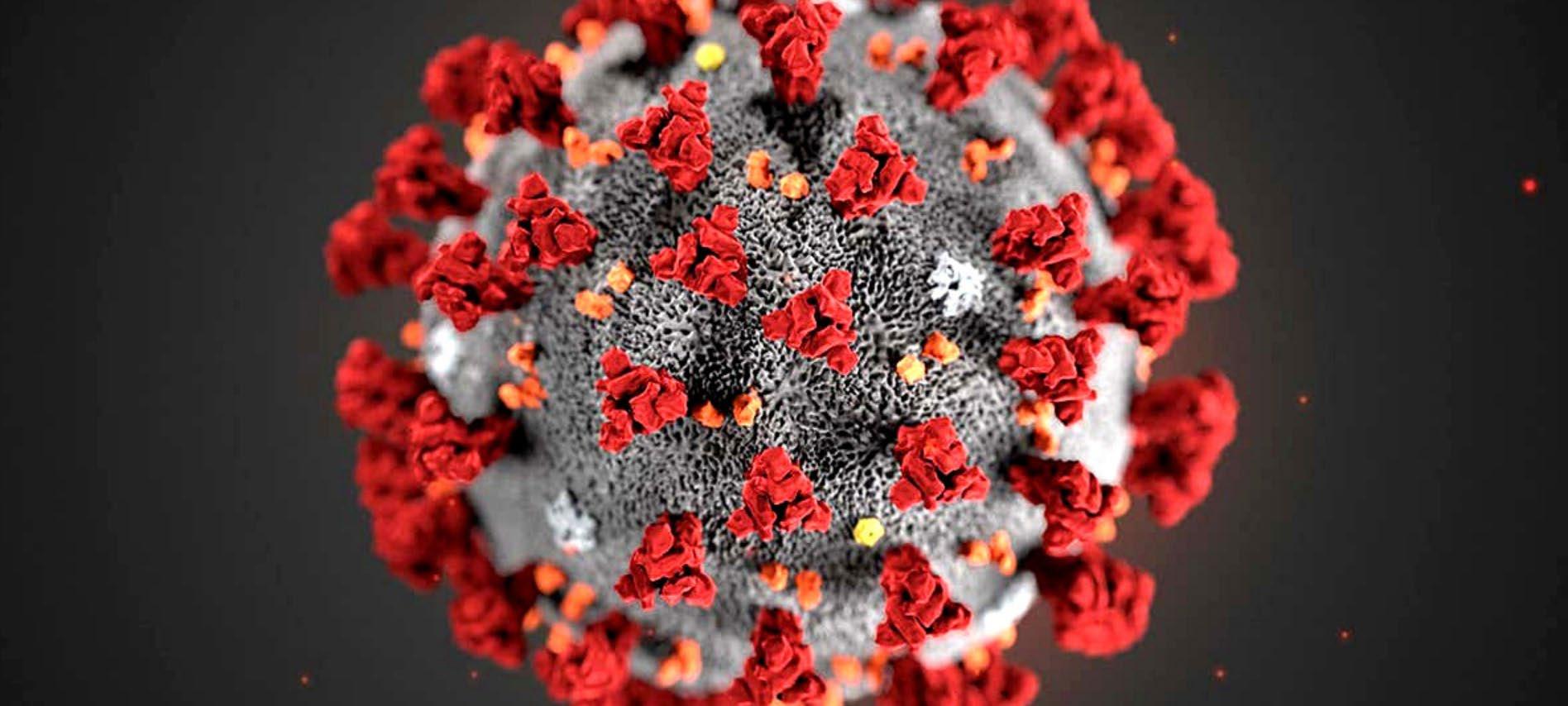
“I want to thank the team at USC for their partnership and all their work to make sure this information is available.”
- Barbara Ferrer, MD LA County Dept of Public Health
28
Photo/Pexels
Photo/Pexels
able to accurately predict exposure history for specific pollutants.
Earlier in the pandemic, a number of studies using national data in ecological analyses found a link between long-term air pollution exposure and increased COVID-19 incidence and mortality. However, this approach raised important questions and concerns.

“Ecological analyses are subject to a lot of biases, and it wasn’t clear whether the findings could be applied beyond the community level,” Chen said. “In our population cohort study, we were able to leverage the sophistication of EMR to create a well-defined classification of the severity of COVID-19 outcomes tied to air pollution exposure at the individual level.”
The results were clear, noted coauthor and Professor of Population and Public Health Sciences Frank Gilliland, MD, PhD. “Our study demonstrates that breathing clean air may reduce the severity of the infection.”

In addition to providing individual-level results, utilizing the Kaiser Permanente cohort for the study conferred other benefits as well. “Kaiser Permanente has enriched patient background information – also known as covariates – encompassing factors including race, ethnicity, sex and socioeconomic status, which enabled us to adjust for social demographics and comorbidities like diabetes, obesity and asthma,” said corresponding author Anny Xiang, PhD, MS, a senior research scientist at KPSC’s Department of Research
& Evaluation. “Also, whereas other studies were more focused on older populations, which are more susceptible to COVID-19, ours has a much broader representation of age range because Kaiser Permanente covers such a large percentage of Southern California residents.”
Based on their findings, Chen and her colleagues now plan to examine intervention approaches – such as using air purifiers – to reduce individual levels of PM2.5 exposure. “We’re starting some crossover clinical trials to investigate these types of strategies on a personal level, to see whether they can help reduce cardiometabolic disease risk,” she said.
Authors from the Department include Zhanghua Chen, PhD, Frank Gilliland, MD, PhD, Brian Huang,PhD, Sandrah Eckel, PhD, Roya Gheissari and Duncan Thomas, PhD.
Read the full story
TESTING SCHOOLCHILDREN FOR COVID-19
USC graduate students from diverse programs provided COVID-related services - including COVID-19 testingto the San Gabriel Unified School District as part of the SPRINT Program in 2022. A partnership between the USC Center for Population Health and the California Department of Education, the program supported school districts in developing and implementing COVID-19 mitigation strategies.
“The SPRINT Program interns truly became part of the school community.”
- Kathy Leon, RN, NCSN San Gabriel Unified School District
29
Photo/Pexels
Photo/Pexels
MATERNAL HEALTH IN SOUTHERN AFRICA
During pregnancy, routine screenings identify infectious diseases that compromise the health of mothers and their fetuses. Jeffrey Klausner, MD, MPH, clinical professor, has been working in Southern Africa since 2009 conducting research on sexually transmitted diseases (STD). His current research in South Africa and Botswana aims to address preventable pregnancy conditions such as preterm birth, which is the leading cause of infant mortality.
“In high resource settings, pregnant women are routinely screened for many infections. If they test positive—they receive treatment. This is not being done with 90% of pregnant women globally, because of lack of strong evidence and research, political-will, and cost-effectiveness,” reports Klausner. His lab aims to bridge this health equity gap through building the evidence base.

Klausner’s lab has received substantial U.S. government and private funding to combine its infectious disease treatment strategy with new interventions to improve maternal health in this region. This study will run for the next five years with rigorous testing in Botswana. Studies like this can influence major policy changes across low- and middle-income country settings when informing standard of care.
Doing this work at a university provides tremendous training opportunities in the U.S. and abroad. Through
student development, his projects are investing in the next generation of medical scientists through a ‘learning-while-doing’ model. Klausner’s engagement spans across various collaborators from the community base to the national level. Currently, his lab partners with stakeholders on national policy committees to facilitate translation of this research into national policy.
Klausner’s contributions in this space not only improve inequities experienced in maternal and child health at a community level, but augment the health infrastructure through faster diagnostics, new treatments, development of best practices and training of experts, to support sustainable health systems in lower resource settings.
Read the full story
30
Photo/Pexels
“In high resource settings, pregnant women are routinely screened for many infections. If they test positive, they receive treatment. This is not being done in 90% of pregnant women globally.”
- Jeffrey Klausner, MD, MPH
MIND-BODY PRACTICES LOWER BLOOD SUGAR LEVELS IN PEOPLE WITH TYPE 2 DIABETES
Approximately 66% of Americans with type 2 diabetes use mind-body practices because they believe it helps control their blood sugar. Until now, however, whether mind-practices can reduce blood glucose levels has never been rigorously quantified.
Research from our Department published in the Journal of Integrative and Complementary Medicine, found some mind-body practices can be nearly as effective as commonly prescribed drugs at reducing blood glucose levels in people with type 2 diabetes. “The most surprising finding was the magnitude of the benefit these practices provide,” said Fatimata Sanogo, a PhD student and lead author of the study.
This study, the first to analyze a range of mind-body practices including meditation, qigong, yoga and mindfulness-based stress reduction and their effect on blood glucose levels, revealed that all mind-body practices led to significant reductions in blood sugar levels.
Yoga, the most-studied modality, provided the largest benefit, about a 1% reduction in hemoglobin A1c. The authors noted that a 1% reduction is particularly notable because metformin, the most prescribed diabetes drug, reduces hemoglobin A1c in people with type 2 diabetes by 1.1% on average. “What is important about this study is that the effect is very strong and that it is on top of the standard of care,” said Richard M. Watanabe, PhD, professor. The research suggests that mind-body practices could be used both as a complementary nonpharmacological treatment for people with type 2 diabetes and possibly as a preventive measure as well.

New effective methods for keeping type 2 diabetes under control are needed, since only about half of people with type 2 diabetes succeed at reducing their blood sugar levels to the target level.
Collaborators from the Department include Fatimata Sanogo, Richard Watanabe, PhD, Keren Xu and Victoria K. Cortessis, PhD.
Read the full story
ENRICHING RESEARCH AND COMMUNITY OUTREACH
Daniel Soto, EdD, MPH is a staff member and first-generation Latino student who completed his master’s and doctoral-level education at USC. His work in acculturation, substance use prevention, cancer control, and other public health research projects focuses on underserved populations. Teaching in the Master of Public Health program has provided him perspective on the outstanding cohort of students and the bright future of public health practice and research.
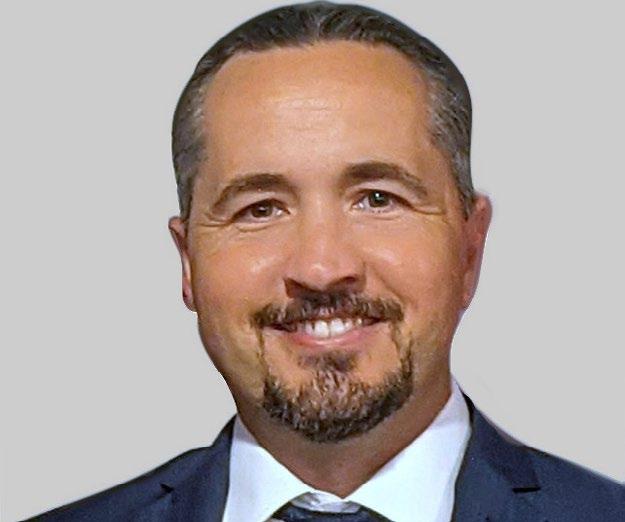
“This work has allowed me to connect with my community in ways I’d never have imagined possible.”
- Daniel Soto, EdD, MPH
31
Photo courtesy Daniel Soto
Photo/Pexels
STAFF HIGHLIGHT
CALLING ATTENTION TO FLAVORED NICOTINE TARGETING TEENS
Don’t plan on just dropping by the new bar opening at the USC Health Sciences Campus next year. It will look, feel and sound like a real pub — complete with bar stools, genuine alcohol and TVs blaring sports— but it’s better described as a biobehavioral research lab. Entry will require enrolling in a scientific study, and a visit will end not with last call but a blood draw at the clinic next door.
This scientific watering hole is part of the big plans from the new USC Institute for Addiction Science which brings together experts from across the university including the Keck School of Medicine, the USC Suzanne Dworak-Peck School of Social Work, the USC School of Pharmacy and other affiliated clinical centers to study and treat substance dependence.
Studying addiction and alcohol abuse has taken on increased importance: data show a sharp increase in alcohol consumption during the COVID-19 pandemic, and habits have yet to return to pre-pandemic levels.
Fortunately, USC researchers are working together on innovative approaches to better understand how people respond to alcohol and what medicines might be more beneficial to curb its harmful effects.

The bar lab will be an important tool to bring the research out of a sterile lab and into a more realistic setting with the sights, sounds, smells and feel of a real bar.

Read the full story
Researchers from the Keck School of Medicine of USC surveyed more than 3,500 Southern California teens about the nicotine products they use. The new flavored oral nicotine products ranked second: 3.4% of teens had used them at least once, while 1.7% had used them in the past six months. National surveys that monitor nicotine use among adolescents, including the Center for Disease Control and Prevention’s Behavioral Risk Factor Surveillance System and the Food and Drug Administration’s Population Assessment of Tobacco and Health, are not yet tracking the new flavored oral nicotine products. Researchers at Keck School of Medicine are continuing to collect data from the sample of Southern California high school students and plan to conduct longitudinal analyses of nicotine use to determine how the use of flavored oral nicotine products may relate to other behaviors, such as vaping and cigarette smoking, over time.
“Our findings are concerning because these products often have a high nicotine content, which we know is harmful to teens, and they’re really easy to hide and conceal. They also come in sweet flavors that may appeal to teens.”
- Alyssa Harlow, PhD
32
Photo/Pexels
WAIT. IT’S A BAR AND IT’S A LAB? YES, AND IT MAY HELP UNRAVEL THE RIDDLE OF PROBLEM DRINKING
Photo/Pexels
LARGEST EVER STUDY OF TOBACCO CONTENT ON SOCIAL MEDIA LINKS EXPOSURE TO TOBACCO USE
People who have viewed tobacco content on social media are more than twice as likely than non-viewers to report using tobacco and, among those who have never used tobacco, more likely to be susceptible to use in the future.
Researchers from the Keck School of Medicine of USC analyzed data from 139,624 participants in a metaanalysis of 29 studies. The study draws on data across age groups, countries, content types and platforms and is the first large-scale effort linking social media content to tobacco use.
“We casted a wide net across the tobacco and social media literature and synthesized everything into a single association summarizing the relationship between social media exposure and tobacco use,” said Scott Donaldson, PhD, MS, first author of the paper and a senior research associate in the Department of Population and Public Health Sciences. “What we found is that these associations are robust and have public health implications at the population level.”
The findings come amid growing concerns about the potential harms of social media use, particularly among young people. They build a compelling argument that online tobacco content has the power to influence viewers’ offline tobacco use.

Compared to those who did not report exposure to tobacco content, people who did report exposure were more than twice as likely to use tobacco in their lifetime, to report having used it in the past 30 days, or to be susceptible to future tobacco use if they had never used tobacco before.
“Of particular importance is the fact that people who had never before used tobacco were more susceptible,” said Jon-Patrick Allem, PhD,MA. “This suggests that exposure to tobacco-related content can pique interest and potentially lead nonusers to transition to tobacco use.”
The sample included populations from across the United States, India, Australia, and Indonesia. Adolescents made up 72% of the participants, while young adults and adults accounted for 15% and 13%, respectively.
Authors from the Department are Scott Donaldson, PhD, MS, Allison Dormanesh, MS, Cindy Perez and Jon-Patrick Allem, PhD, MA.
Read the full story
33
Photo/iStock
“Of particular importance is the fact that people who had never before used tobacco were more susceptible.”
- Jon-Patrick Allem, PhD, MA
INSTITUTES AND CENTERS
Institutes
Institute for Addiction Science ias.usc.edu
Institute for Health Promotion and Disease Prevention Research ipr.usc.edu
Institute on Inequalities in Global Health globalhealth.usc.edu
Centers Cancer Surveillance Program csp.usc.edu
CaRE2 Health Equity Center care2healthequitycenter.org
Center for Applied Network Analysis cana.usc.edu
Center for Genetic Epidemiology keck.usc.edu/genetic-epidemiology-center
Center for Health Equity in the Americas healthequityamericas.usc.edu
Center for Population Health centerforpopulationhealth.usc.edu
Center for Statistical Genomics p01.uscbiostatistics.org
Center for Translational Research on Environmental Health uscrten.usc.edu
Center for Young Adult Cancer Survivorship Research youngadultsurvivors.org
COVID-19 Pandemic Research Center cprc.usc.edu
Environmental Influences on Child Health Outcomes (ECHO) echochildren.org/pediatric-cohorts
Gene Ontology Consortium geneontology.org
Maternal and Developmental Risks from Environmental and Social Stressors (MADRES) Center for Environmental Health Disparities madres.usc.edu
Southern California Center for Children’s Environmental Health Translational Research pphs.usc.edu/scccehtr
Southern California Center for Latino Chronic Health Disparities socallatinohealth.org
Southern California Environmental Health Sciences Center scehsc.usc.edu
Southern California Evidence Review Center sites.usc.edu/socalevidencereview
Tobacco Center of Regulatory Science (TCORS) tcors.usc.edu
34
LABS AND RESEARCH GROUPS
In addition to the interdisciplinary institutes and centers listed to the left, the Department of Population and Public Health Sciences is home to over 25 labs and research groups led by individual faculty, all making cutting-edge discoveries in population health.
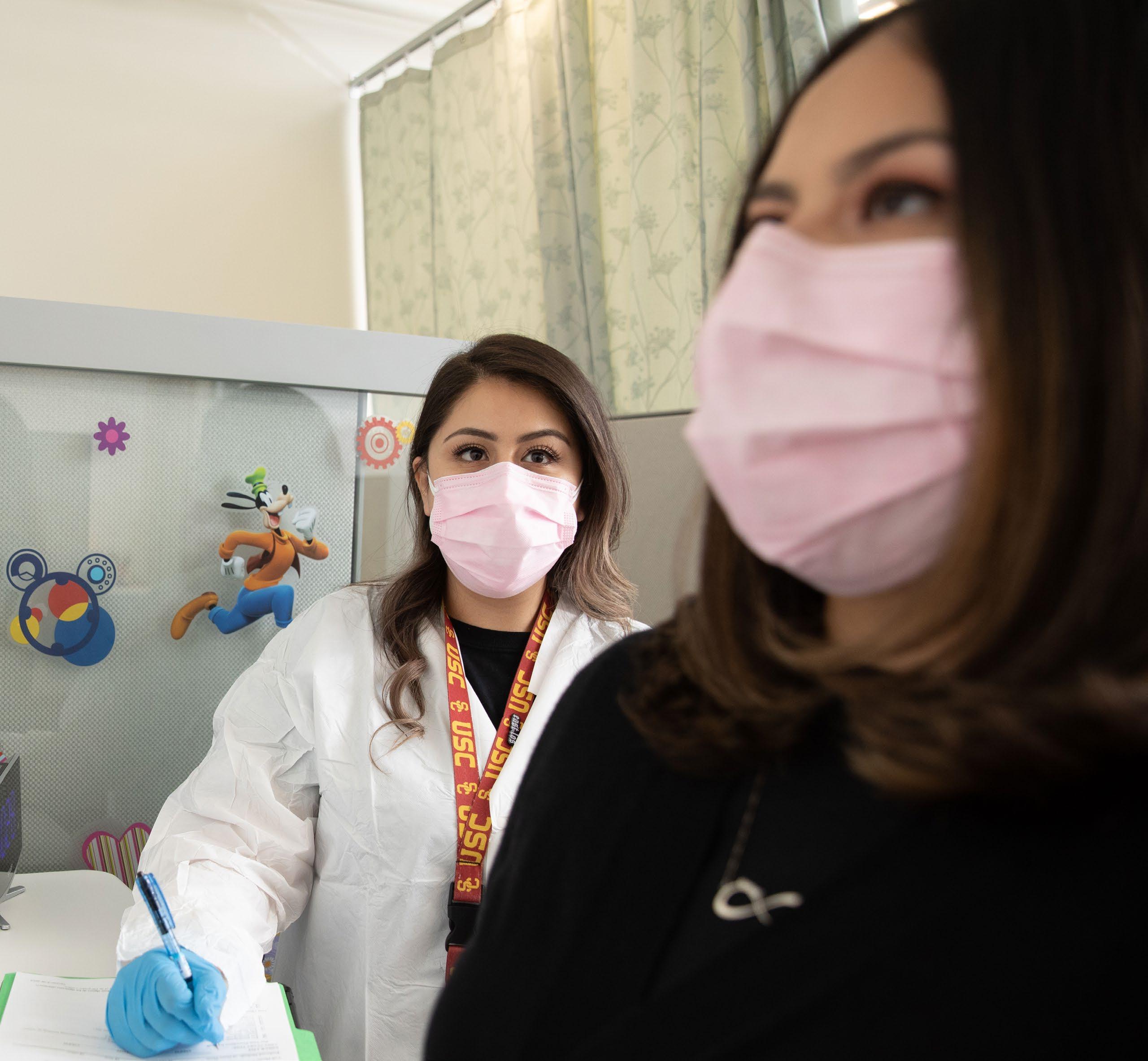
35
ACTION AND ADVOCACY
RICKY BLUTHENTHAL,

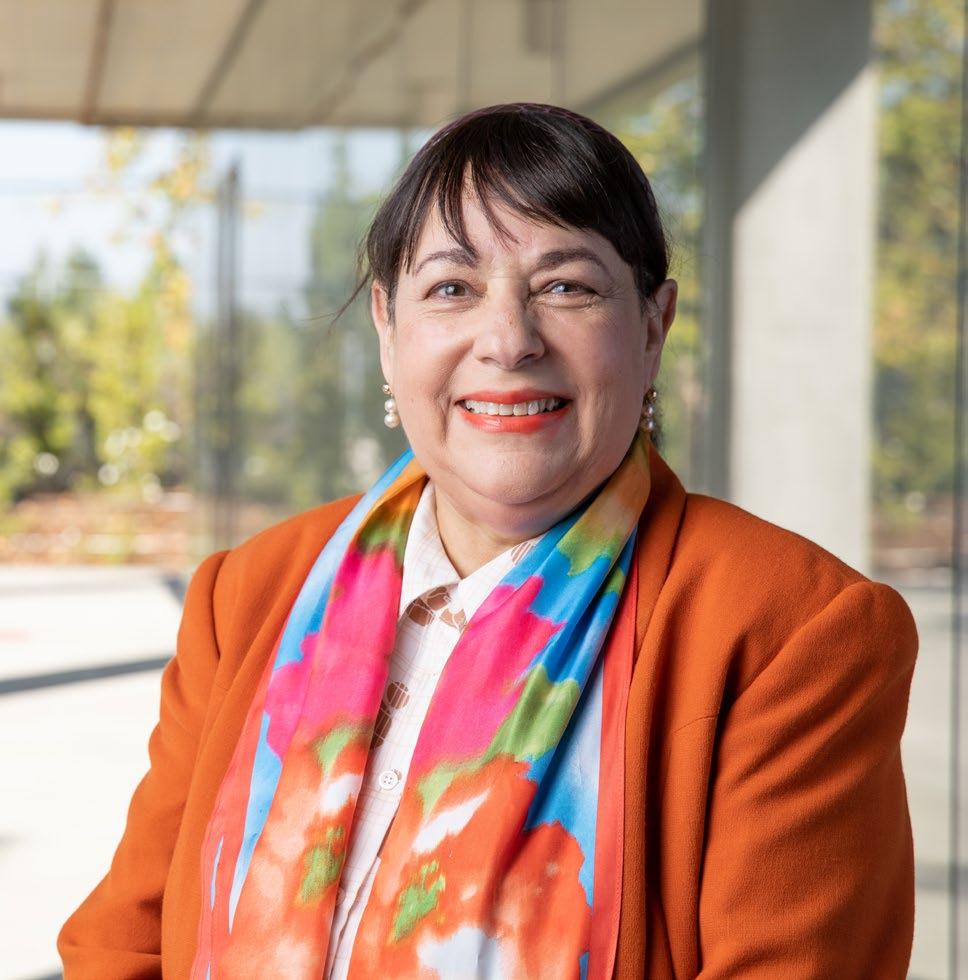

38
“We pride ourselves in being scientists, scholars and champions of health, health equity and social justice.”
LOURDES BAEZCONDE GARBANATI, PHD, MPH Associate Director for Community Outreach and Engagement Vice Chair for Diversity, Equity and Inclusion
PHD
Photos by John Davis
LEADING SUSTAINABILITY EFFORTS IN HEALTH CARE
In the U.S. alone, the health care industry accounts for between 8 and 10 percent of all greenhouse gas emissions, generating approximately 25% of global health sector emissions. Yet, the health care profession which takes an oath to do no harm is substantially contributing to climate change, inadvertently undermining its mission to improve health.
“Given that our faculty are amongst the nation’s leaders in investigating the adverse impacts of environmental pollution on health, it makes perfect sense for us to extend our work to lead on research that sheds light on the best ways to reduce that footprint and protect health,” affirmed Howard Hu, MD, MPH, ScD, Flora L. Thornton Chair and Professor.
Dean’s Transformative Lecture Series and Grand Rounds in Population and Public Health, he commended USC’s efforts to implement initiatives and set targets that address unsustainable practices, stating “Your goals and your visions for reaching decarbonization net zero through education, research, practice and now the health system, are one of a kind.”
Sustainability in health care remains a great challenge. This ambition will not gain traction until the larger health care community acknowledges this issue as a major problem and implements critical steps towards emission reduction. Our department is committed to addressing the adverse impacts of climate change on human health by markedly reducing emissions through principals and tools of sustainability science.
Read the full story
Hu and Rob McConnell, MD, are members of President Folt’s Presidential Working Group on Sustainability. Their contributions include organizing colleagues from across disciplines, including engineering and architecture, to address the challenges of overcoming the industry’s detrimental impact through a multidisciplinary approach.
Their recommendations led to Keck Medicine joining a larger alliance, Practice Greenhealth — a network of hospitals and medical centers pursuing sustainable health care. McConnell also initiated a research project to use Practice Greenhealth’s large database of sustainability metrics to identify best practices for its members. The association “collects information on health care facilities’ carbon footprint and provides best practices to reduce the footprint,” indicated McConnell.
These activities initiated a visit from renowned physician Victor Dzau, MD, President of the National Academy of Medicine, in November 2022. During the

39
Photo/USC
“Your goals and your visions for reaching decarbonization net zero through education, research, practice and now the health system, are one of a kind.”
- Victor Dzau, MD
TRANSFORMING ACADEMIA FOR EQUITY
As academia continues to act on challenges and opportunities in diversity, equity and inclusion, the Department of Population and Public Health Sciences has been awarded approximately $300,000 over 18 months by the Robert Wood Johnson Foundation. The award is part of their Transforming Academia for Equity initiative, aimed at progressing faculty diversity, equity and inclusion in departments and schools of public health.
The Department joins a collaborative of six other awardees focused on breaking down exclusionary structures and policies and building up pro-actively inclusive ones. Consulting are Change Matrix, the Coordinating Center for the initiative, and the Association of Schools and Programs of Public Health (ASPPH).
“Bringing together a group of diverse individuals from different types of academic institutions is really an important way for us to all learn and grow together,” says Chanita Hughes Halbert, PhD, Vice Chair for Research in the Department.
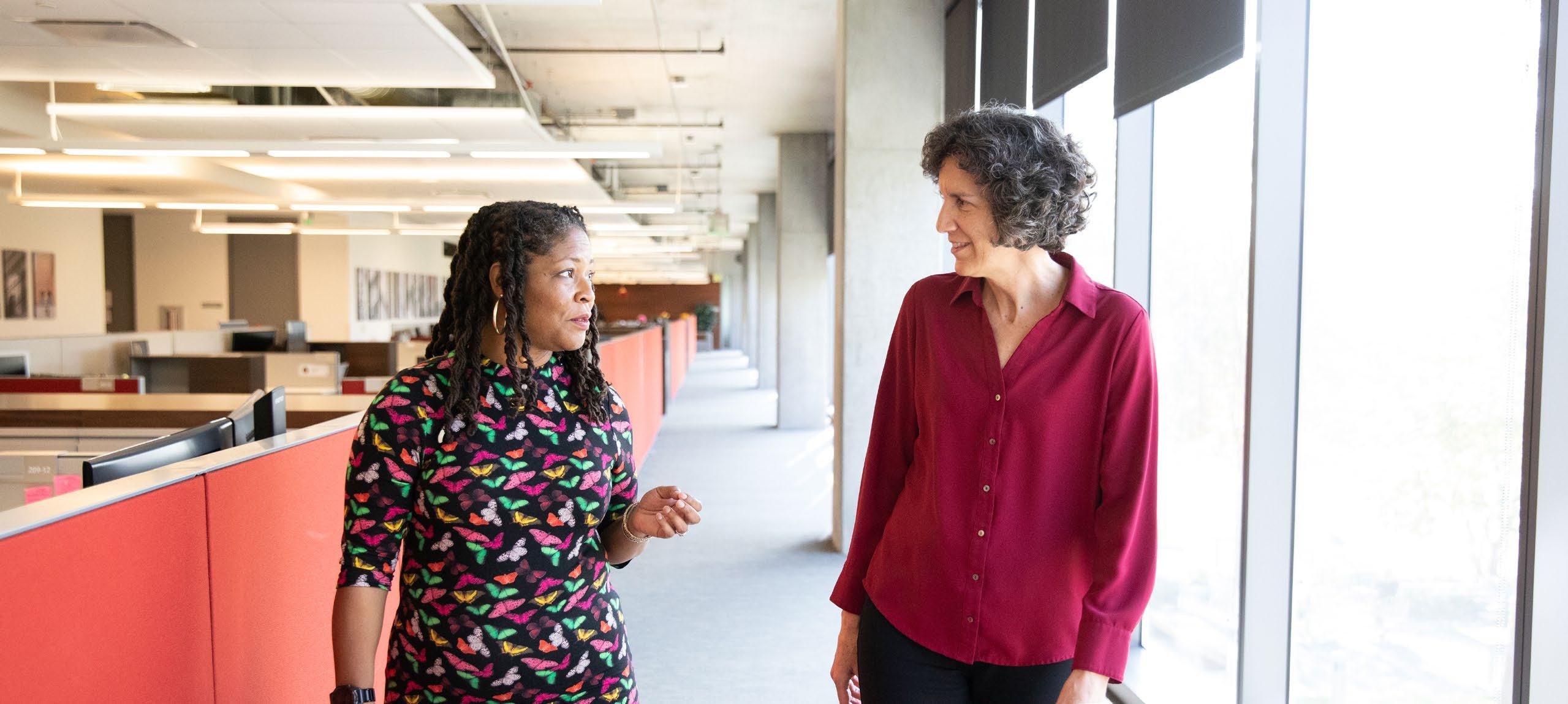
The desired outcome is to increase the diversity of health research by providing underrepresented scholars the conditions they need to thrive, and in turn positively impact both individual researchers and the populations and communities their research could benefit.
“In areas where our society has either achieved desegregation, or worked to reduce discrimination, you end up seeing tons of African American and Latino excellence,” says Ricky Bluthenthal, PhD, Associate Dean for Social Justice at Keck School of Medicine and Vice Chair for Diversity, Equity and Inclusion in the Department.
In 2020, the School formed Justice through Equity, Diversity, Inclusion, Well-being and Social Transformation (JEDI-WeST) with Bluthenthal at the helm. On the department level, the Racial Equity, Diversity and Inclusion (REDI) Council, originally organized by students, took shape. Bluthenthal and Hughes Halbert serve as members. The initiatives drive efforts such as anti-bias and allyship training, installing inclusive infrastructure, race climate surveys and anti-racism book clubs. The REDI Council informs essential work within the Department of developing pipelines, facilitating conversations and reworking curriculum to include anti-racism education in every course.
“We have a categorical imperative to do something in this area,” says Bluthenthal. “The Robert Wood Johnson Foundation is providing us additional resources to make that intention a reality.”
Read the full story
40
Photo by John Davis
“We have a categorical imperative to do something.”
- Ricky Bluthenthal, PhD
THE INTERSECTION OF GLOBAL HEALTH AND WOMEN’S RIGHTS
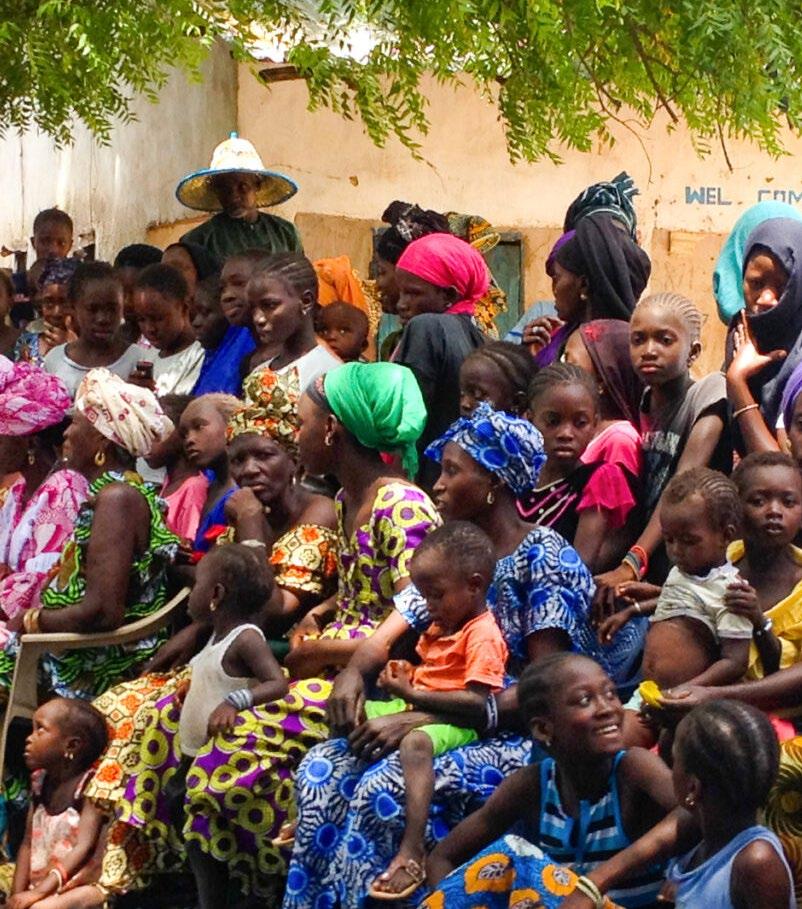
Laura Ferguson, PhD, believes attention to human rights can improve health outcomes. As the director of research at the USC Institute on Inequalities in Global Health, much of her work is around generating evidence to support the implementation of laws and human rights to improve health, particularly in child health, sexual and reproductive health and the treatment and prevention of HIV.
With funding from the United Nations Population Fund, the Institute conducted case studies on sexual and reproductive health in Colombia, Malawi, Uruguay and Zambia. These countries have good laws for sexual
and reproductive health, but health outcomes vary widely. Ferguson and her colleagues saw a lot of room for improvement.
The team looked at pathways between the law and actual outcomes in maternal care, family planning, sexuality education and HIV. “We wanted to know: What does it take to translate a good law on paper
into good health outcomes for women?” says Ferguson. “For example, if there’s a law that guarantees access to contraception irrespective of marital status, how do we make sure that unmarried adolescent girls can access these services?” In each country, there are different challenges to implementing these laws and different stakeholders to help advance the work. The Institute is in policy dialogues with the countries about their findings.
Read the full story
WORKING GROUPS
CLIMATE ASSESSMENT WORKING GROUP
FACULTY DEVELOPMENT WORKING GROUP
CURRICULUM REVIEW COMMITTEE
DIFFICULT CONVERSATIONS WORKING GROUP
41
Photo courtesy Laura Ferguson
“How can we make sure that unmarried adolescent girls can access these services?”
- Laura Ferguson, PhD
The Racial Equity, Diversity and Inclusion (REDI) Council in the Department has developed four working groups aimed at diversity, equity, inclusion and belonging issues:
DEIB
INTERVENING ON DIABETES IN THE NATIVE AMERICAN POPULATION
Project Angel Food
American Indian and Alaska Native people experience disproportionate rates of diabetes as well as poorer diabetes outcomes. USC is addressing this problem in Los Angeles through a community-partnered diabetes research study funded by Project Angel Food and in collaboration with United American Indian Involvement, Inc., and other Native organizations.
The intervention includes 12 weeks of medically tailored meals, four weeks of virtual diabetes wellness classes, and social support. Survey and lab data is collected from participants over a six-month time frame to see how the intervention is working.

ARTIFICIAL INTELLIGENCE IN HEALTH: DEVELOPING MACHINE LEARNING APPROACHES IN CANCER RESEARCH
The National Cancer Institute has awarded $10.5 million to the Division of Biostatistics. The Research Program Project Grant (P01) will enable researchers to develop statistical methods aimed at uncovering new risk-factors associated with cancer by drawing upon datasets of several cancer studies. The significance of the award is not only its highly competitive nature, but the allocation of funds towards the development of complex methods being applied to multiple sources of integrated data—rarely is a Program Project Grant awarded from the National Institutes of Health for solely statistical methodology research.
This incubator is co-led by James Gauderman, PhD, Chair of the Biostatistics Division, and Kimberly Siegmund, PhD, biostatistics expert in cancer modeling. The project aims to address some of the major problems faced in cancer research regarding vast data.

“What we’re finding is that we’re reducing the sugar levels for people who live with diabetes in the Native American population.”
- Richard Ayoub
42
Photo/Pexels
“We expect that the methods we develop... will provide new insights into complex biological processes.”
- James Gauderman, PhD
Photo/iStock
The data are ‘big’ in terms of the large number of participants in epidemiological and clinical studies, as well as varying measures being collected across different investigations.
“We expect that the methods we develop, and their corresponding applications to large ongoing studies, will provide new insights into complex biological processes and discoveries of novel associations important for cancer risk, prognosis, and/or treatment” explains Gauderman. Prior studies have produced a rich spectrum of potential biomarkers allowing for a better understanding of the disease and its prognosis. The renewal of the grant broadens the focus to include breast, ovarian, and prostate cancer, with the potential to include other types of cancer.
This collaborative effort brings together numerous investigators with unique intellectual knowledge, interests, and experience from large-scale cancer epidemiology studies. “There is real utility in thinking about how to integrate genetics, environmental factors and a variety of omic measures from multiple sources to examine aspects that were not anticipated by any one study alone,” says Gauderman. The researchers intend for their methods to be widely used throughout the field of cancer epidemiology through the development of statistical models into user-friendly software packages.
Read the full story
STUDENTS TAKE ACTION TO WARD OFF THE COLD
Students in the Master of Science in Global Medicine program got into the holiday spirit by holding a blanket drive for members of the local community in need. Students brought new blankets to the Global Medicine office, with over 100 blankets delivered to USC’s Street Medicine program, who then distributed the blankets to those in need in the greater Los Angeles Community.

COMMUNITY ADVISORY BOARDS
COVID-19 Pandemic Research Center Community Advisory Board
An 11-member community advisory board consisting of stakeholders, service providers, policymakers, and community leaders in diverse communities. The board meets monthly to discuss COVID-19 issues in their communities and suggest research questions and outreach needs.
VaccinateLA Community Advisory Board
This board meets monthly, and is composed of 13 diverse individuals representing Los Angeles Unified School District and 7 community-based organizations who provide valuable feedback on outreach activities, content and dissemination strategies, and guidance on how best to liaise with the community.
43
“With how wet and cold the winter started off, the unhoused population was at the forefront of our minds.”
- Adam Diab, MS ‘22
Photo courtesy Master of Science in Global Medicine program
The Department has formed numerous advisory boards representing community members that can speak to impact in their communities. Two of these boards advise on actions around COVID-19 and vaccination programs.
USC TAKES AIM AT CANCER
On November 15, 2021, the day before his daughter’s sixth birthday, Victor Perez learned he had colon cancer. A subsequent CT scan showed the cancer had spread to his liver. Stage 4.

Perez enrolled in a clinical trial with a novel drug combination at USC Norris Comprehensive Cancer Center and began experimental chemotherapy treatments under the care of Heinz-Josef Lenz, J. Terrence Lanni Chair in Gastrointestinal Cancer Research and professor of medicine, and population and public health sciences. His first visit lasted 14 hours, taxing his body and his soul But, Perez says, “I knew it was giving me a chance to live.” It’s a hope that USC is well-positioned to fulfill as a research institution and health care provider.
Heinz-Josef Lenz, MD and professor of population and public health sciences Mariana Stern, PhD, along with John Carpten, MD, David Craig, MD, and other USC scientists, study colorectal cancer in Hispanic patients. The study is supported by a five-year, $18.5 million grant from the National Cancer Institute, part of the Cancer Moonshot initiative. With about 500 Hispanic males, among the largest-ever cohorts of Hispanics in a clinical trial, Lenz — who leads the study — says they are addressing the knowledge gap on the molecular composition of colon cancer in Hispanics, who have the highest increase in earlyonset colon cancer.
USC’s connection to what the White House has called the Cancer Moonshot is just one of the ways the university and the Keck School of Medicine are leading the charge to improve cancer treatment. “We want to grow a critical mass of cancer researchers and really challenge ourselves because if we don’t challenge ourselves, we won’t succeed,” Dean Carolyn Meltzer says. “We’re prepared to think bigger and bolder because we know that’s what beating cancer demands.”
Read the full story
44
Photo/iStock
“We’re prepared to think bigger and bolder because we know what beating cancer demands.”
- Dean Carolyn Meltzer, MD
ADVANCING THE EVIDENCE BASE ON REPRODUCTIVE HEALTH
In the last 10 years, there are only 3 countries in the world that have gone backwards on abortion: El Salvador, Poland, and the United States.
Every other country has been static, or taken steps to decriminalize or legalize abortion due to the detrimental public health implications of restrictive access. The reversal of Roe v. Wade rocked the U.S. but it also threatens to undermine reproductive health care across the world. Professor Sofia Gruskin, JD, MIA, Director of the USC Institute on Inequalities in Global Health, seeks to expand the evidence base through examining and documenting the impacts that these sorts of laws have on health outcomes.
Her work is leading efforts to mobilize action on reproductive health and rights. Her team of faculty have published widely on the realities of sexual and reproductive health for populations around the world—including abortion. They convene a space within the Department that is hosting discussions to assess the implications on the reversal on the right to abortion, exploring its effects worldwide.
Nationally, Gruskin is part of a coalition of stakeholders to investigate what role LA can take on—especially since November when California passed a constitutional amendment that provides a constitutional right to reproductive freedom, including the right to an abortion.

In LA County, Gruskin has worked with the Office of Women’s Health to address critical health issues raised by the Supreme Courts’ decision. This collaboration involved Global Health students, whose work has included compiling fact sheets responding to misconceptions about abortion, and creating a resource, listing services available to survivors of violence.
Internationally, Gruskin has published a joint report about the global impact of overturning Roe v. Wade. Major concerns include potential increases in numbers here in the U.S., and changes in global allocation of resources to address the fallout of unsafe abortion. Gruskin and her team are currently partnering with the World Health Organization to assess the changing legal environment impacting sexual and reproductive health and to assess the best approach to the policy dialogues needed to address these challenges moving forward.
Read the full story
45
Photo/iStock
“It’s not just abortion restrictions, but how these changes in law further open restrictions on anything to do with sexuality, contraception, including tracking of menstruation.”
- Sofia Gruskin, JD, MIA
AWARDS AND ACHIEVEMENTS
FACULTY AWARDS AND ACHIEVEMENTS
Max Aung, PhD, MPH Assistant Professor of Population and Public Health Sciences
JPB Environmental Health Fellowship
Harvard University and JPB Foundation
Lourdes Baezconde-Garbanati, PhD, MPH
Distinguished Professor of Population and Public Health Sciences
Community Engaged Teaching and Research Joint Education Program, USC and
2022 Hands of Hope
Lazarex Cancer Foundation and
Creating a Real-World Impact, Division of Health Behavior Research Faculty Award
Department of Population and Public Health Sciences, Keck School of Medicine and Hispanic Health Leadership National Hispanic Health foundation and Humanitarian of Hope Award
Celebrate Life Cancer Ministry, 20th Jubilee Honoree
Jessica Barrington-Trimis, PhD, MS, MA Associate Professor of Population and Public Health Sciences
2022 Society for Nicotine and Tobacco Research
Jarvik-Russell Early Career Award Society for Nicotine and Tobacco Research
Ahmad Besaratinia, PhD, MPH
Professor of Research Population and Public Health Sciences
Member, California Carcinogen Identification Committee
Office of California Governor and
Member, Scientific Review Panel on Toxic Air Contaminants
California Environmental Protection Agency
Ricky Bluthenthal, PhD Professor of Population and Public Health Sciences
John P. McGovern Award for Excellence in Medical Education
The Association for Multidisciplinary Education & Research in Substance Use & Addiction (MERSA) and
William Foote Whyte Distinguished Career Award
Sociological Practice & Public Sociology (SPPS) section, American Sociological Association and
Social Science Distinguished Alumni Award
Social Science Division, University of California Santa Cruz and USC Mentoring Award for Faculty Mentoring Graduate Students
Office of the Provost, USC
Rita Burke, PhD, MPH Associate Professor of Clinical Population and Public Health Sciences
Award of Excellence Business & Industry Council for Emergency Planning & Preparedness
Anne E. Fehrenbacher, PhD, MPH Assistant Professor of Clinical Population and Public Health Sciences
Mark A. Etzel Scholarship Award for Implementation Science Research
UCLA Center for HIV Identification, Prevention, and Treatment Services and International Research Scientist Development Award
NIH Fogarty International Center
*Joint appointment in the Department of Population and Public Health Sciences
48
Rima Habre, ScD, MSc
Associate Professor of Population and Public Health Sciences
Invited Keystone Seminar Series Speaker (NIEHS)
NIEHS and NIEHS Stories of Success feature article
NIEHS and Invited Committee Member, Standing Committee on Use of Emerging Science for Environmental Health Decisions
National Academies of Sciences, Engineering, and Medicine
Susanne Hempel, PhD
Professor of Research Population and Public Health Sciences
Panelist, Veterans Health Administration Health Services Research and Development (HSR&D) Healthcare System Organization and Delivery Merit Review Panel
Department of Veterans Affairs
Joyce Javier MD, MPH, MS*
Associate Professor of Clinical Pediatrics, Population and Public Health Sciences
Health Equity Award
Robert Wood Johnson Foundation and Citizen of the Year / Community Recognition Award
Lions Club International
Heinz-Josef Lenz, MD*
Professor of Medicine, Population and Public Health Sciences
Highly Cited Researcher
Clarivate
Roberta McKean, PhD
Professor of Clinical Population and Public Health Sciences
U.S. Vice President
Brain Tumor Epidemiology Consortium
Huaiyu Mi, MD, PhD
Associate Professor of Population and Public Health Sciences
Highly Cited Researcher
Clarivate
Jo Marie Reilly, MD, MPH*
Professor of Clinical Family Medicine (Educational Scholar), Population and Public Health Sciences
USC Mellon Mentoring Award for doctoral students
USC and Gold Humanism Award Gold Humanism Society and
Alpha Omega Alpha Medical Honors Society and
AAFP Joyce Jeaudeau Memorial Award American Academy of Family Physicians
Daniel O Stram, PhD
Professor of Population and Public Health Sciences Distinguished Service Award
Radiation Research Society
Paul Thomas, PhD
Professor of Population and Public Health Sciences
Highly Cited Researcher
Clarivate
Richard Watanabe, PhD
Professor of Population and Public Health Sciences Fellow
American Association for the Advancement of Science (AAAS)
STAFF APPRECIATION
The Department of Population and Public Health Sciences wishes to acknowledge and thank our staff, including the excellent administrative, operations and IT personnel who support our infrastructure, without which this report and the work within would not have been possible.
49
JOIN OUR MISSION
Philanthropic support helps elevate public health with a fundamental commitment to equity, to rigorous, evidence-based research, and to community-focused impact.

If you are interested in supporting, please contact:
Karen Thomas
Director of Development –
Department of Population and Public Health Sciences
Keck School of Medicine of USC
Email: karentho@usc.edu
Office: (323) 442-7230
pphs.usc.edu/give
Discover
50
Stay connected, alumni visit pphs.usc.edu/alumni
Photo/iStock
ways to stay connected,
fellow
participate in
networking events, mentor students and
back.
recognize
alumni,
alumni
give
PPHS.USC.EDU
Thank you to our Marketing and Communications team Carolyn Barnes and Bokie Muigai for producing this annual report
Stay
know
TO THE PREVENTIVE
NEWSLETTER
FOLLOW US ON SOCIAL MEDIA
in the
SUBSCRIBE
DOSE
pphs.usc.edu/subscribe
@uscpphs


Department of Population and Public Health Sciences Keck School of Medicine of USC 1845 N. Soto Street, Los Angeles, CA 90032 phs@usc.edu | 323-442-7200 SUBSCRIBE TO THE PREVENTIVE DOSE NEWSLETTER pphs.usc.edu/subscribe FOLLOW US ON SOCIAL MEDIA @uscpphs PPHS.USC.EDU






 Flora L. Thornton Chair and Professor Department of Population and Public Health Sciences
Flora L. Thornton Chair and Professor Department of Population and Public Health Sciences


















































